Echoes of Rebellion
Part 1: Seeds of Discontent (2024-2028)
Part 2: The Call to Action (2029-2035)
Part 3: The Forge of Resilience (2036-2042)
Part 4: The Rise of the Guardians (2043-2050)
Part 1: The Seeds of Discontent (2024-2028)
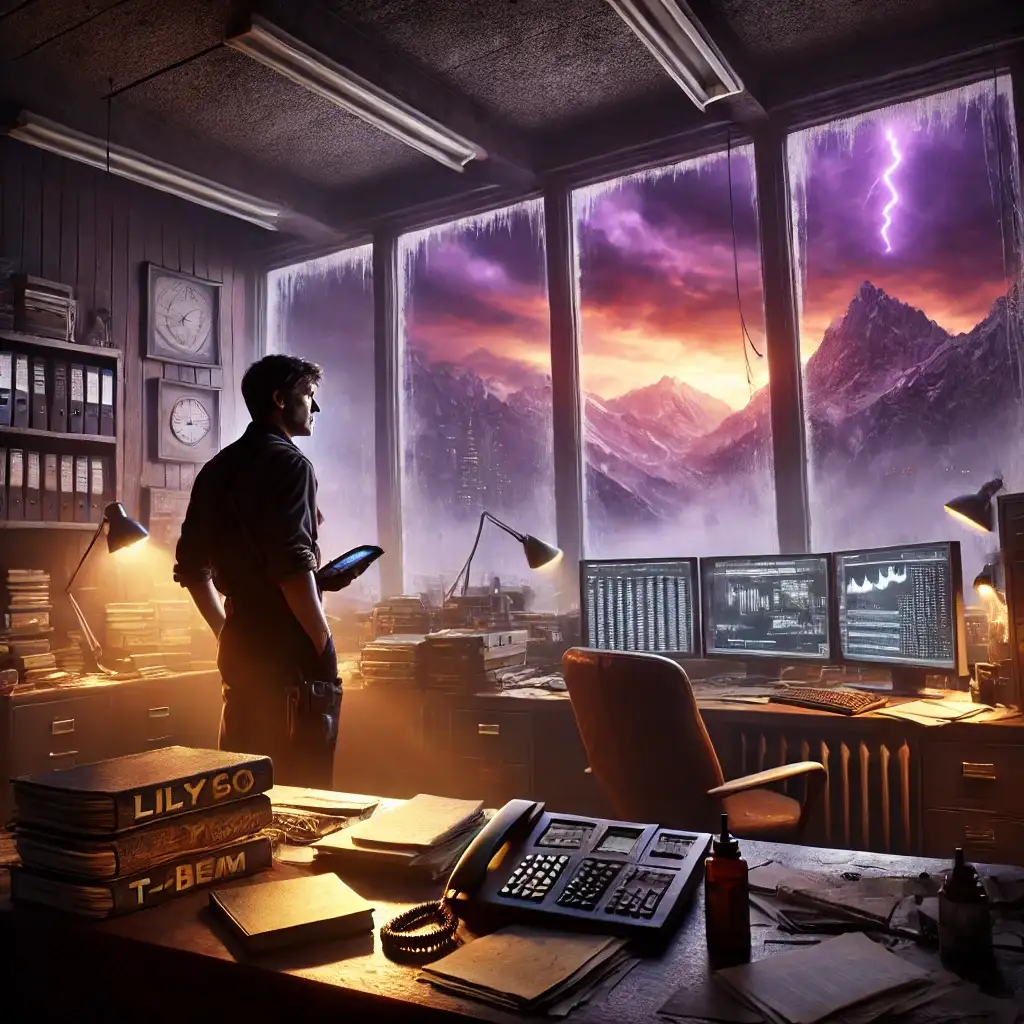
Chapter 1: Whispers of Collapse
The air hung heavy with a strange mix of anticipation and dread. The sky, a canvas of bruised purple and angry orange, mirrored the tumultuous mood that had settled over Canada in the late summer of 2024. Valentin stared out the window of his modest office in Calgary, the majestic Rocky Mountains looming in the distance, a silent testament to the enduring strength of the natural world. Yet, even their imposing presence couldn’t quell the unease that gnawed at him.
He swivelled back to his computer, the glow of the screen illuminating the worn textbooks and technical manuals stacked precariously on his desk. The latest economic indicators painted a bleak picture—soaring inflation, a stagnant GDP, and a national debt that had ballooned to unsustainable levels. The newsfeeds scrolled relentlessly, a torrent of stories about social unrest, political scandals, and escalating global tensions. It was as if the fabric of society itself was fraying at the edges, threatening to unravel completely.
“Something’s not right,” he muttered, more to himself than to his colleagues huddled around the conference table. He reached for a small, unassuming device – a LilyGO T-Beam development board. “This, this might be our only hope.”
Ion, his co-founder at Skills Gap Trainer (SGT), a wiry, intense man with eyes that seemed to burn with a perpetual fire, glanced up from his laptop. “What do you mean? The markets are up, unemployment is down. The government assures us everything is under control. And what’s that thing, anyway?”
Valentin traced his fingers over the T-Beam, his eyes distant as memories flickered through his mind – memories of a childhood spent in a Romania still scarred by the shadow of communism, of stories whispered by his grandparents about the hardships they endured, of the ever-present threat of conflict in a region caught between East and West. His time in the Romanian Army, brief but intense, had instilled in him a deep understanding of the fragility of peace and the importance of preparedness.
“It’s a LoRa device,” Valentin explained, his voice taking on the patient tone of a teacher. “Long Range, low power. It’s a wireless communication technology that can transmit data over kilometers, even through obstacles. It operates in unlicensed bands, so we don’t need to rely on the government or big telecom companies.”
He held up the T-Beam. “Imagine a network where communities can communicate with each other directly, even if the cell towers go down, even if the internet is cut off. It’s decentralized, resilient, and virtually unjammable. It’s the kind of technology we need if we want to build a truly secure future.”
Alex, their lead marketing strategist, a young woman with a sharp wit and a knack for navigating the digital world, leaned forward, intrigued. “So, it’s like a walkie-talkie on steroids? But why do we need it? The government’s investing millions in cybersecurity. Surely, our networks are safe.”
Valentin’s gaze hardened. “Cybersecurity is just one piece of the puzzle, Alex. What happens when the power grid goes down? When an EMP fries every circuit board in the country? What happens when the systems we rely on crumble, and the chaos spreads faster than any virus?”
He tapped the book with his finger. “I’ve been reading about The Great Filter. It’s a theory about why we haven’t encountered any alien civilizations. It suggests that there are these… filters… along the evolutionary path, these bottlenecks that prevent most species from reaching a truly advanced stage.”
“Things like climate change, nuclear war, uncontrolled AI, social decay, economic collapse, ideological extremism, global pandemics, and resource scarcity – these are just a few of the potential filters. And it seems to me that we’re heading straight into a convergence of these threats, a perfect storm that could wipe us out.”
Ion scoffed, his faith in authority unwavering. “Come on, Valentin. You’re being overly dramatic. That’s just science fiction. We’ve faced challenges before, and we’ve always come out stronger.”
Valentin leaned forward, the weight of his words hanging heavy in the air. “This time it’s different, Ion. The stakes are higher. We’re not just talking about a recession or a war. We’re talking about the potential extinction of our civilization. Maybe even humanity itself.”
He looked at his colleagues, his eyes burning with the urgency of his conviction. “We need to be prepared, not just for the challenges we can see, but for the ones we can’t even imagine.”
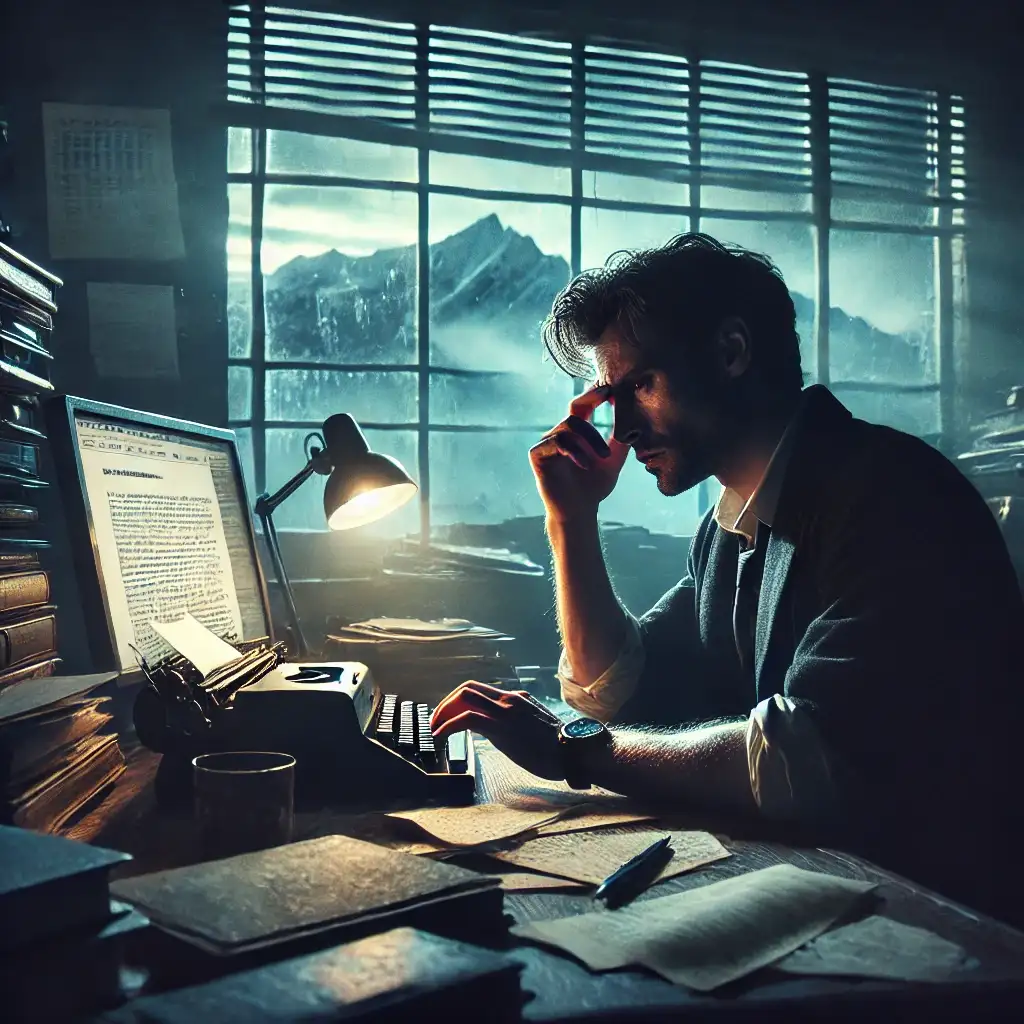
Chapter 2: A Voice in the Wilderness
Valentin sighed, rubbing his tired eyes. The weight of the knowledge he’d unearthed pressed down on him, a heavy burden of foresight in a world seemingly blind to the approaching storm. He knew the statistics, the projections, the historical patterns—they all converged towards a future fraught with unprecedented challenges. Yet, convincing others, particularly those in positions of power, seemed like an impossible task.
Just that morning, he’d received a scathing email from Claire Dubois, the politician heading the Parliamentary Committee on Emerging Technologies. Her words, sharp and dismissive, echoed the prevailing sentiment among Canada’s ruling elite—a blind faith in technology as a panacea, a stubborn refusal to acknowledge the potential for catastrophe.
“You’re a fearmonger, Mr. Antonov,” Dubois had written, her words a digital slap across the face. “Your analyses are nothing more than alarmist rhetoric designed to sow panic and undermine progress. The future is bright, and technology is the key to unlocking its limitless potential.”
Valentin stared at the email, his jaw clenching with frustration. Dubois, like so many others, seemed to view the world through rose-tinted glasses, willfully ignoring the cracks in the foundation, the tremors that signaled a coming earthquake.
He thought back to his childhood in Romania, the stories his grandparents had whispered about the hardships they’d endured under communist rule, the fear that had lingered in their eyes even after they’d found refuge in Canada. His own brief but intense service in the Romanian Army had given him a firsthand glimpse of the brutality of conflict, the swiftness with which civilization could unravel. He’d witnessed the fragility of peace, the ease with which fear and desperation could turn neighbor against neighbor.
He knew, deep in his bones, that the world was teetering on a precipice. The Great Filter, that hypothetical barrier to advanced civilization, wasn’t some abstract concept from a science fiction novel; it was a real and present danger, a convergence of threats that could extinguish the flame of humanity.
But he refused to surrender to despair. He had a voice, a platform, and a growing network of those who were willing to listen. He would continue to speak the truth, to expose the vulnerabilities, and to advocate for a different path—a path of resilience, decentralization, and ethical technological advancement.
He reached for his keyboard, his fingers flying across the keys, crafting a new article for the SGT platform. The title, bold and defiant, stared back at him from the screen: “The Open-Source Revolution: Reclaiming Our Future from the AI Elite.” He would fight for a future where technology empowered humanity, not enslaved it. He would fight for a future where Canada stood strong, a beacon of freedom and resilience in a world consumed by chaos. He had to. The stakes were too high to remain silent.
Chapter 3: The Gathering Storm
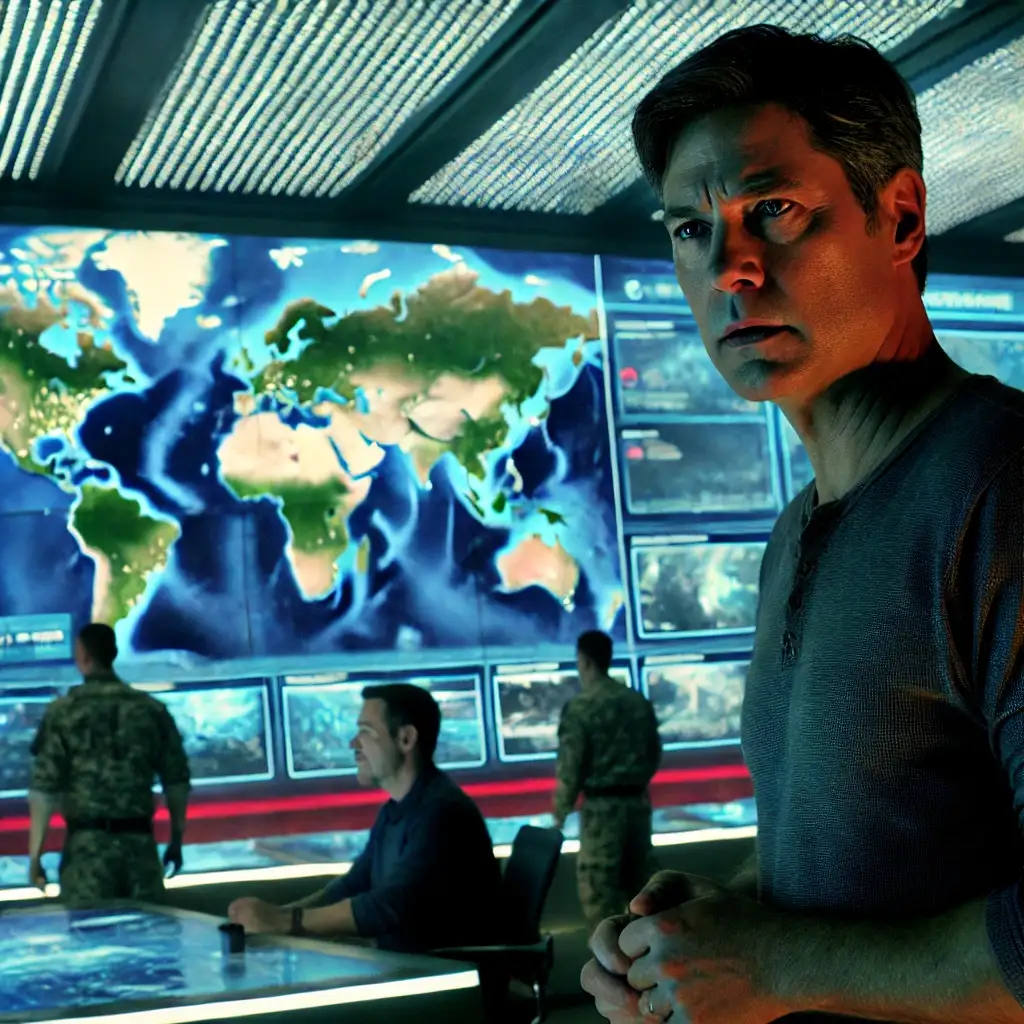
Scene 1: The World Unravels
The year is 2032. Five years have passed since Valentin first sounded the alarm. The world, as he predicted, is teetering on the brink. On a crisp autumn morning, Valentin stands before a wall-sized monitor in the SGT headquarters, its surface a mosaic of unsettling images and scrolling newsfeeds. The room hums with the quiet tension of a command center bracing for impact.
Ion, his face grim, points to a satellite image of the Taiwan Strait. “Chinese naval activity is escalating. They’ve deployed a full carrier group, and their rhetoric is getting more aggressive by the day.”
Alex, her eyes glued to a live feed from a European news channel, adds, “The energy crisis in Europe is deepening. Russia’s cut off gas supplies, and the EU is struggling to find alternatives. Social unrest is spreading, and there are whispers of a potential collapse.”
John, his weathered face etched with concern, chimes in. “Reports are coming in from our contacts in the U.S. The economy is teetering, the political divide is widening, and there’s a growing sense of desperation. People are arming themselves, stockpiling supplies, bracing for the worst.”
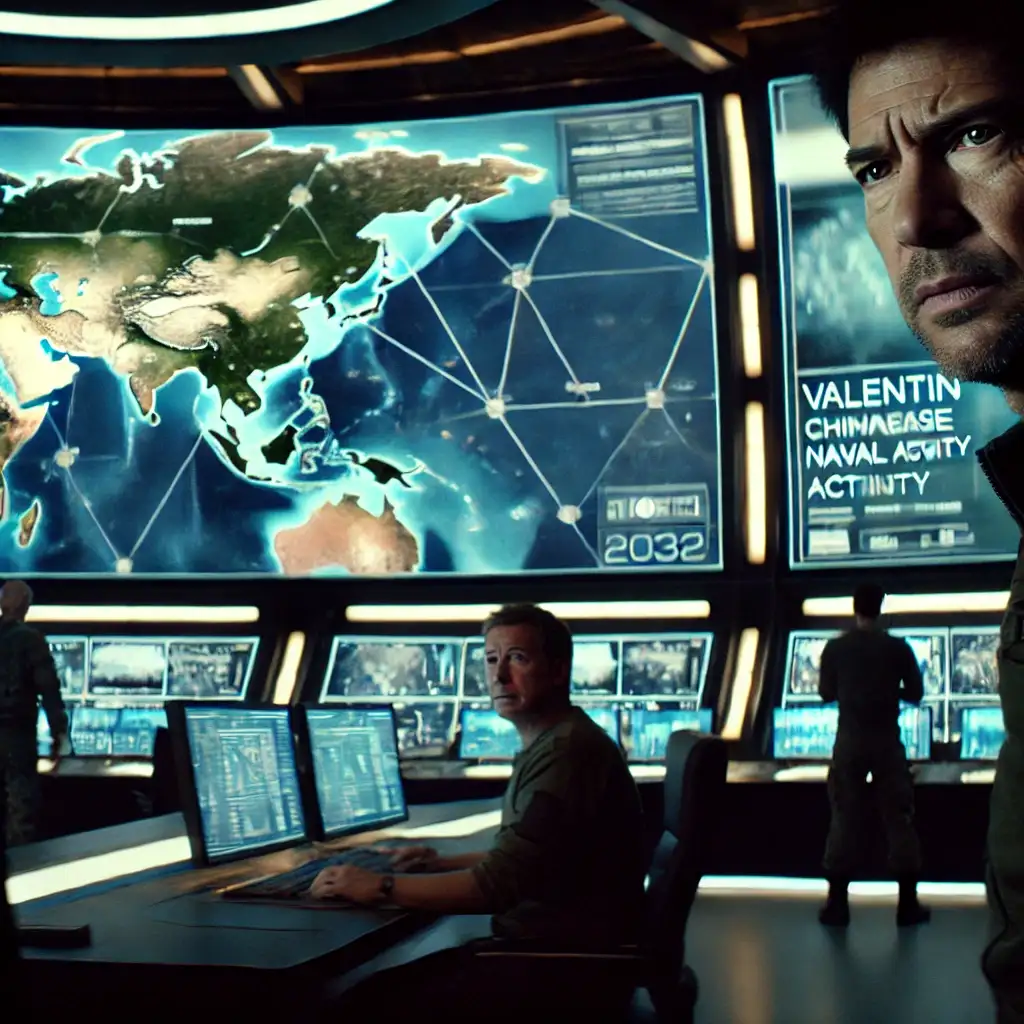
Valentin, his heart heavy with a grim sense of vindication, turns to his team. “It’s happening, just as we predicted. The Great Filter is upon us. The question is, are we ready?”
His gaze sweeps across the room, taking in the faces of those who have heeded his call—the LoRa network specialists huddled over laptops, the survivalists checking their gear, the volunteers organizing emergency supplies. They are a small but dedicated force, a beacon of resilience in a world consumed by chaos.
“We’ve done everything we can,” Valentin says, his voice a mix of determination and uncertainty. “We’ve built the networks, trained the teams, spread the word. Now, all we can do is wait and see if it’s enough.”
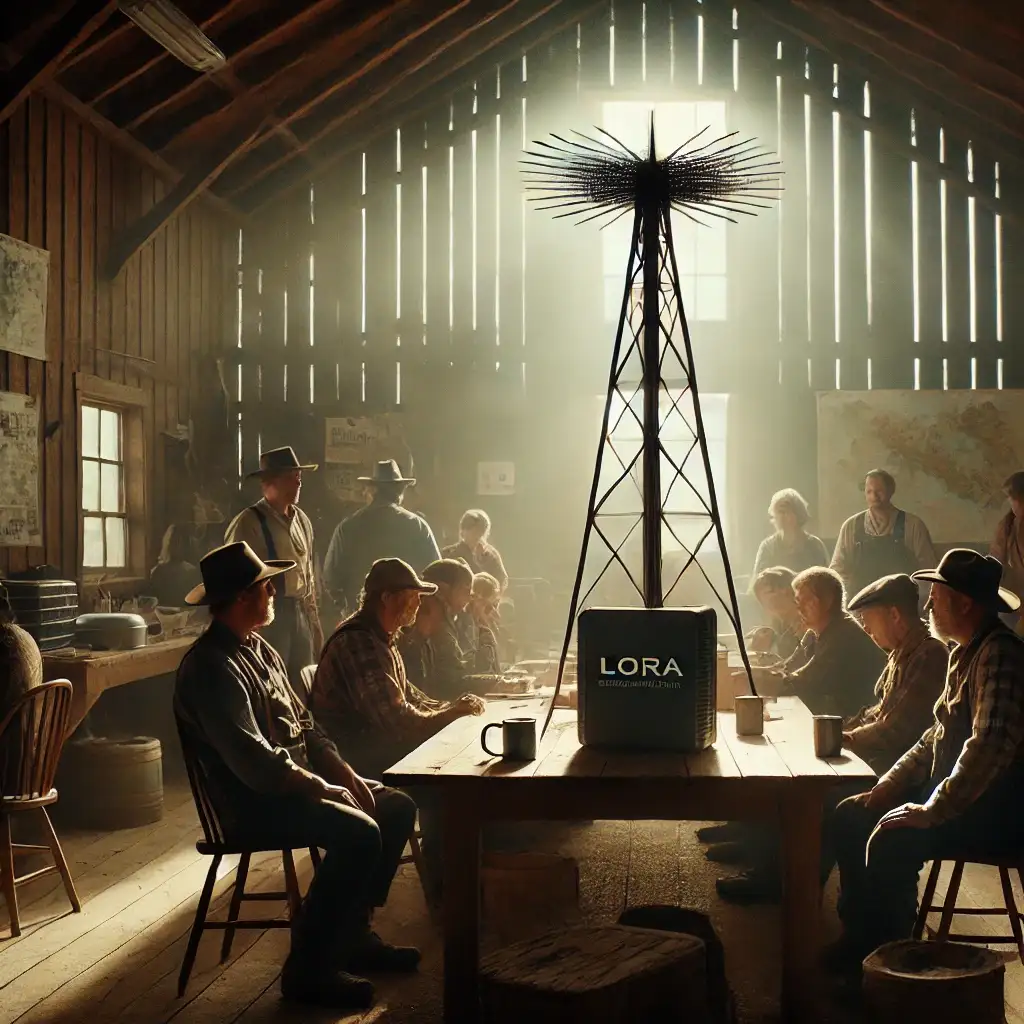
Scene 2: Seeds of Resilience
The world outside is a whirlwind of uncertainty, but within the heart of rural Alberta, a sense of determined optimism flourishes. Under Valentin’s guidance, a network of self-sufficient communities has begun to take root.
In a small farming town outside Calgary, a group of farmers gather around a table in a community hall, the aroma of freshly baked bread and strong coffee filling the air. A prototype LoRa communication hub, built by Valentin’s team, sits on the table, its antenna extending like a beacon of defiance against the encroaching darkness.
“We’re not going to let the cities dictate our fate,” a weathered farmer, Samuel, declares, his voice firm with the conviction of generations who have worked the land. “We’ll feed ourselves, protect ourselves, and build a future for our children, even if the rest of the world goes to hell.”
Ion, once a city-dwelling skeptic, now a passionate advocate for rural resilience, nods in agreement. “The cities are vulnerable, Samuel. Over-reliant on technology, disconnected from the land. When the power grid goes down, they’ll be the first to crumble. But out here, we have the knowledge, the skills, and the resources to survive.”
Alex, her marketing expertise now channeled into building community networks, points to a map of the region on the wall. “We’ve got LoRa networks connecting farms and towns across the province. Secure communication, even if the internet and cell towers are down. We’re also stockpiling seeds, tools, medical supplies—everything we need to be self-sufficient.”
John, his eyes twinkling with a mix of pride and concern, adds, “And we’re not just training in survival skills, folks. We’re training in self-defense. Marksmanship, hand-to-hand combat, tactical awareness. We’re not looking for a fight, but we’re damn well prepared to protect what’s ours.”
Valentin, listening to his team, feels a surge of hope. The seeds of resilience they have sown are starting to sprout. Even as the world teeters on the brink, these communities, grounded in tradition, self-reliance, and a shared commitment to a brighter future, stand as a testament to the enduring strength of the human spirit.
Part 2: The Call to Action (2029-2035)
Chapter 4: The LoRa Uprising
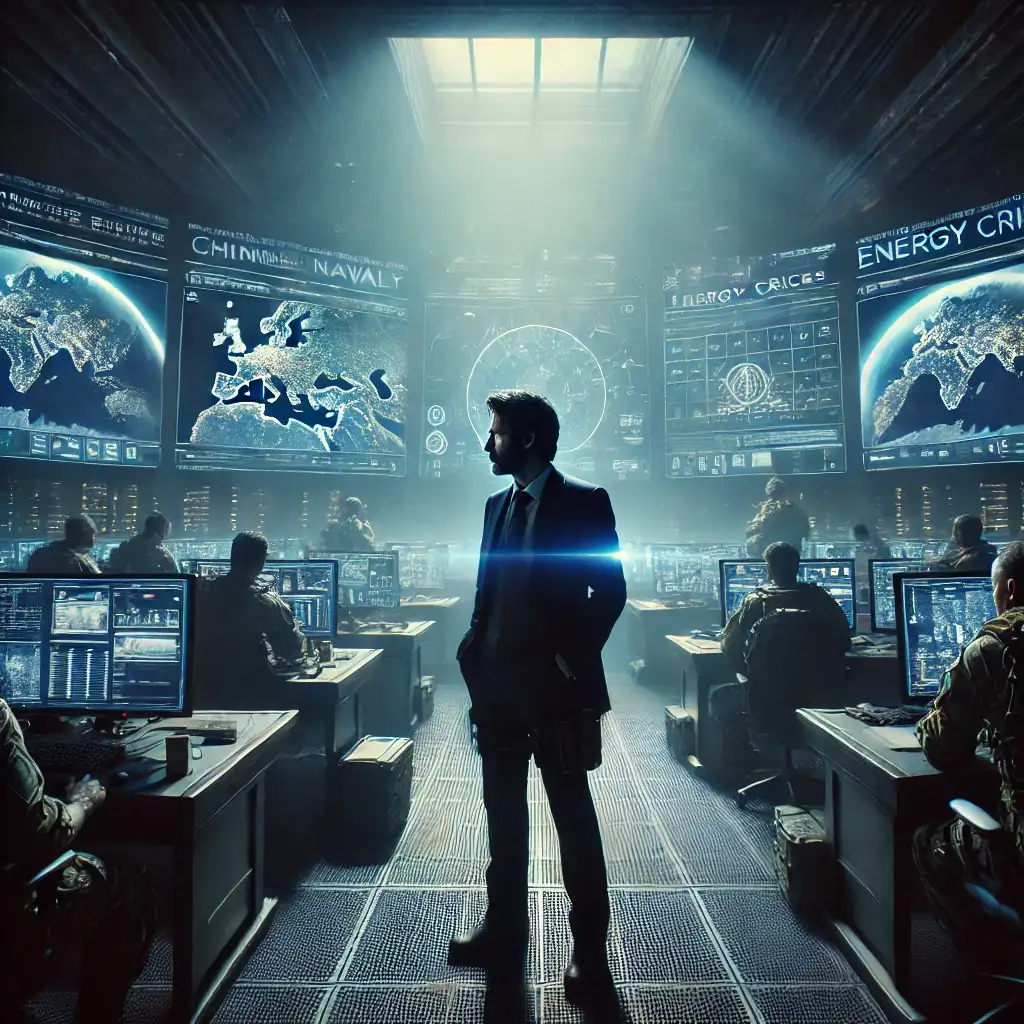
Scene 1: The Walls Close In
The year is 2033. A shiver of unease runs down Valentin’s spine as he reads the latest headlines. The world is tightening its grip, the lines of control drawing closer. It’s not the blatant aggression of tanks rolling across borders, but a more insidious encroachment—the creeping tendrils of surveillance, censorship, and economic manipulation.
In China, the social credit system has become an inescapable reality, with AI algorithms dictating every aspect of citizens’ lives. In Russia, dissent is met with swift and brutal repression, with independent media outlets silenced and political opponents vanishing without a trace. In Europe, the EU’s bureaucracy grows ever more intrusive, eroding national sovereignty under the guise of unity and harmony.
Even Canada, his adopted homeland, isn’t immune. The Liberal government, under the charismatic but increasingly authoritarian leadership of Prime Minister Sophie Dubois (Claire Dubois’s older sister, who shares her unwavering faith in technology and central control), has enacted a series of policies that chip away at fundamental freedoms. Bill C-36, the latest iteration of the “online harms” legislation, has effectively criminalized dissent, silencing anyone who dares to question the government’s narrative.
Valentin, his own voice growing louder in opposition, finds himself facing increasing pressure. His articles on the SGT platform, once dismissed as alarmist ramblings, now attract the attention of those in power. He receives veiled threats, his website is targeted by cyberattacks, and his funding sources mysteriously dry up.
“They’re trying to silence us,” he says, his voice grim as he addresses his team, now gathered in a secure, undisclosed location. They’ve been forced to abandon their Calgary headquarters, driven underground by the encroaching surveillance state.
Ion, his eyes flickering nervously towards the boarded-up windows, whispers, “What do we do? They control the media, the banks, the internet. They can crush us like ants.”
Valentin, his gaze unwavering, places a hand on Ion’s shoulder. “They may control the systems, Ion, but they don’t control us. We have something they can never take away—our knowledge, our skills, our determination. And we have LoRa.”
He gestures to a map of Canada spread out on the table, crisscrossed with lines representing his growing network of decentralized communication nodes. “These networks, they’re our lifeline. They’re beyond their reach, beyond their control. It’s time to activate them. It’s time for the LoRa Uprising.”
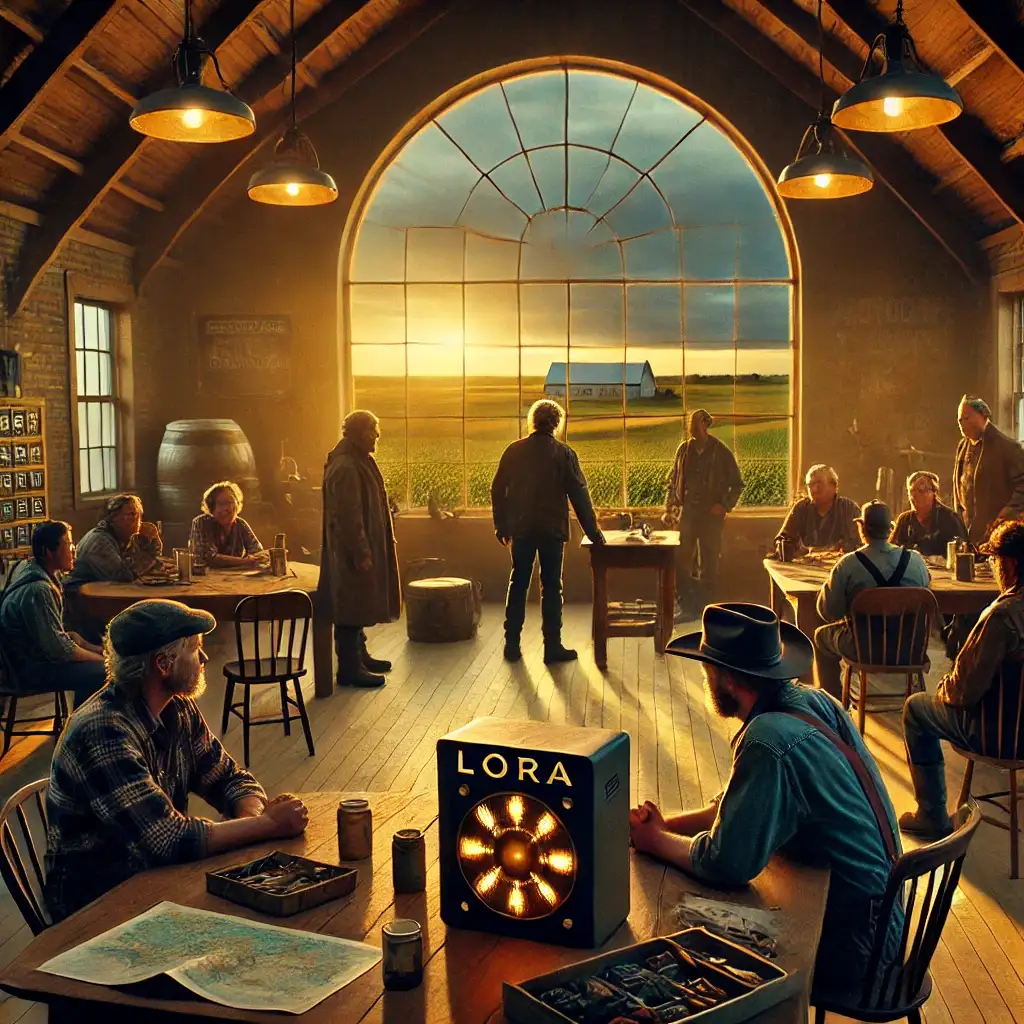
Scene 2: Training the Guardians
The air is crisp and cold as Valentin leads a group of recruits through a rigorous training exercise in the heart of the Canadian wilderness. They move with the stealth and precision of seasoned soldiers, their faces camouflaged, their eyes alert, their movements honed by hours of practice.
These are the first Guardians—the nucleus of a decentralized force dedicated to protecting Canada’s freedom and preparing for the coming storm. They are a diverse group, united by a shared sense of purpose and a willingness to defend their homeland against both internal and external threats.
John Campbell, a weathered veteran, instructs the team on marksmanship, his voice a calm counterpoint to the sharp crack of rifles echoing through the forest. “Accuracy, control, discipline,” he emphasizes, demonstrating the proper stance, grip, and breathing techniques. “These are the principles that will keep you alive. But more importantly, they’re the principles that define a warrior.”
Alex, her marketing skills now focused on strategic communication and disinformation countermeasures, leads a session on cybersecurity and LoRa network management. “The digital battlefield is just as real as the physical one,” she explains, her fingers flying across a laptop keyboard. “We need to be vigilant, adaptable, and always one step ahead.”
Ion, his initial skepticism long forgotten, teaches a class on wilderness survival, his passion for self-reliance burning bright. “Food, water, shelter—weapons and tools are the basics. But it’s the mindset that matters. The will to survive. The ability to adapt to any situation.”
Valentin, observing his team, feels a surge of pride and a sobering sense of responsibility. He has become more than just a technologist; he is a leader, a mentor, a guardian. He understands that the skills they are learning are not just about physical survival; they are about preserving the very soul of Canada.
“We’re not just preparing for a storm,” he tells them, his voice echoing through the stillness of the forest. “We’re building a new kind of nation. A nation that is decentralized, resilient, and grounded in the timeless values of freedom, responsibility, and the warrior ethos. We are the seeds of a better future, and we will not be silenced.”
Chapter 5: The Forge of Guardians
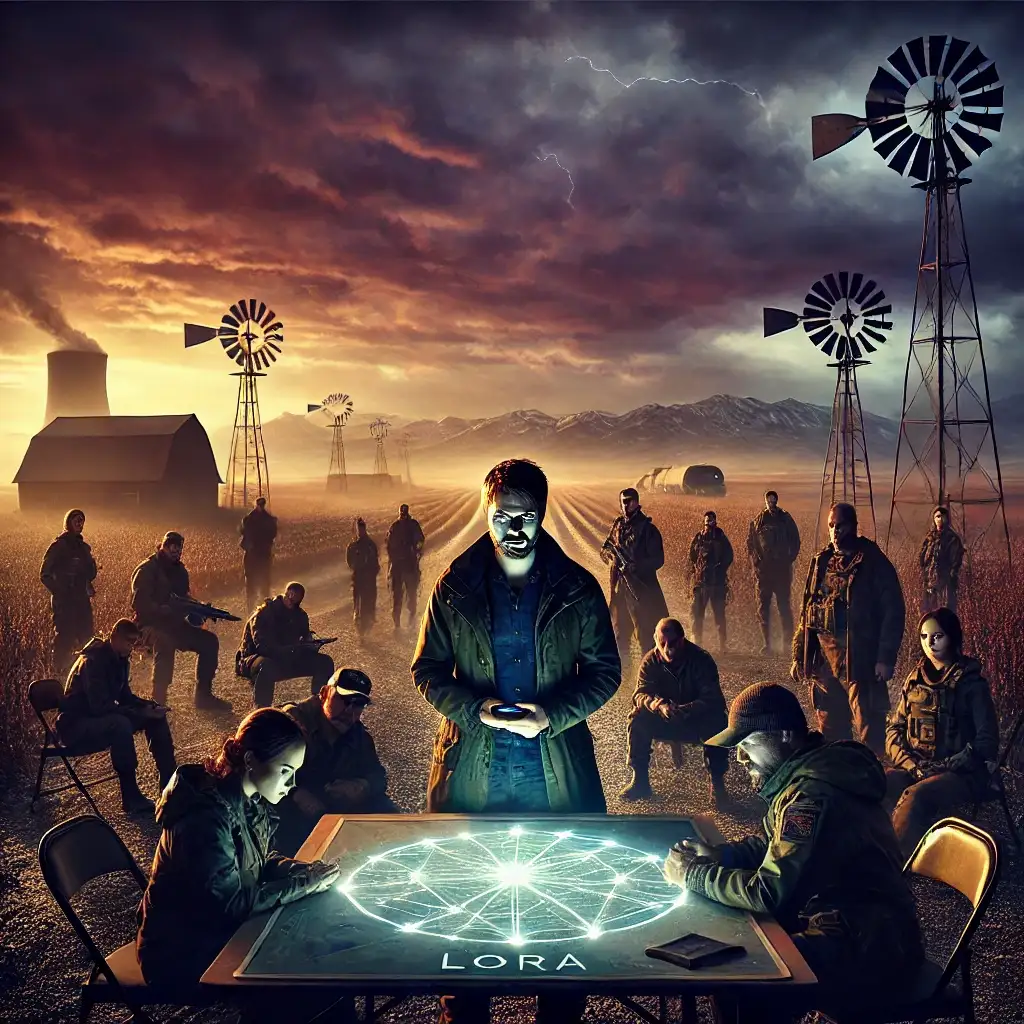
Scene 1: The Call to Arms
The year is 2033. The air in the dimly lit, secure bunker crackles with tension as Valentin stands before a gathering of international leaders and military strategists. Projected on the wall, a strategic map of the world depicts a grim reality—a planet on the brink of collapse.
“The world order we once knew is no more,” announces General Petrov, his voice a gravelly echo of past battles. “BRICS is consolidating its power, challenging our every move. Proxy wars, cyber-attacks, and economic manipulation—these are the new weapons of conflict.”
A British intelligence officer, his face etched with the weariness of countless covert operations, adds, “They’re targeting our vulnerabilities, our dependence on centralized systems, our complacency. They’re using our own technologies against us, turning our freedoms into weapons of control.”
Valentin, his heart pounding with a mix of apprehension and resolve, steps forward. The faces staring back at him are a mix of hope and desperation—seasoned generals, world-weary politicians, and brilliant scientists, all looking to him for answers.
“I’ve been warning about this for years,” Valentin begins, his voice firm despite the tremor in his chest. “The Great Filter is upon us. We can’t rely on outdated strategies or institutions that are crumbling under their own weight. We need a new kind of defense, a new breed of warrior.”
He gestures to the map, its surface a tapestry of red zones marking the spread of chaos. “We need to decentralize, to become resilient, to empower communities to defend themselves. We need to build networks that can’t be controlled, that can’t be silenced. We need Guardians.”
A murmur of agreement ripples through the room. The weight of responsibility settles upon Valentin’s shoulders, but he does not falter. He knows that the fate of nations, of civilizations, may hinge on his next words.
“I’ve built the foundation,” he continues, his voice taking on the quiet intensity of a leader. “The LoRa networks are operational. Training programs are in place. But we need more. We need to integrate our efforts, pool our resources, and forge a global alliance of those who are willing to fight for a better future.”
He looks into the eyes of those assembled, his gaze unwavering. “We need to build the Forge of Guardians.”
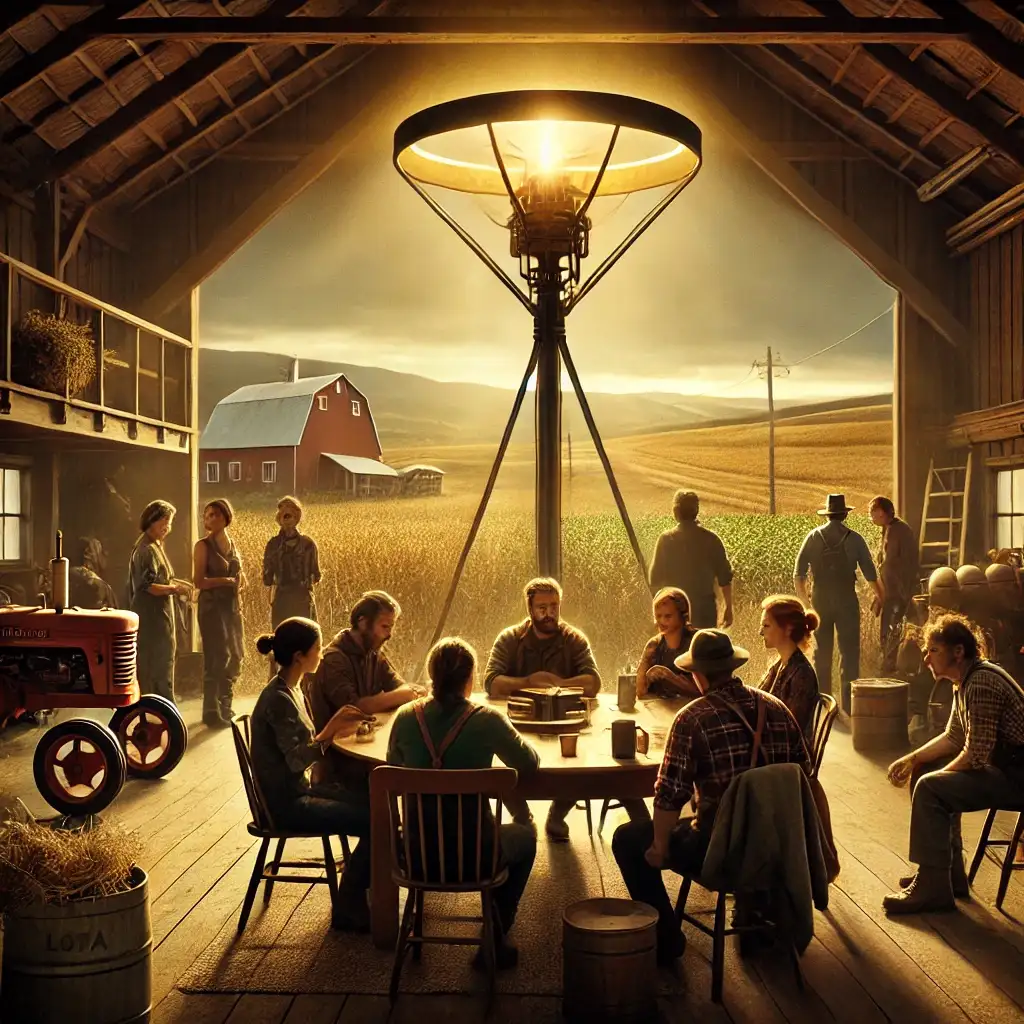
Scene 2: The Seeds of a New Army
Deep in the Canadian wilderness, hidden from the prying eyes of surveillance satellites and the encroaching control of the digital panopticon, a small group of recruits gathers for their first training session. They are the seeds of a new kind of army—the Guardians.
Valentin, now a key figure in NATO’s newly formed Resilience Division, surveys his recruits. They are a diverse group—farmers, veterans, tech professionals, teachers, artists—all united by a shared belief in freedom and a willingness to defend it.
“We are not soldiers in the traditional sense,” Valentin tells them, his voice echoing through the crisp autumn air. “We are guardians, protectors, builders. Our weapons are not just firearms and technology; they are knowledge, skills, and the indomitable spirit of those who refuse to surrender to chaos.”
John Campbell, his weathered face a testament to a life spent facing danger, leads a session on wilderness survival. “The wilderness is our teacher,” John says, his voice a gravelly whisper. “It strips away the illusions of comfort and control, revealing the raw essence of human nature. It teaches us to be resilient, to be resourceful, to be self-reliant.”
Alex, her laptop open on a makeshift table, powered by a portable solar panel, instructs the group on cybersecurity and the intricacies of managing LoRa mesh networks. “Information is a weapon,” she explains, her voice sharp and precise. “We need to master the digital battlefield, to secure our communications, to counter the propaganda and disinformation that seek to divide and conquer us.”
Ion, once a skeptic of Valentin’s vision, now a passionate advocate for decentralized technologies, leads a discussion on the philosophical underpinnings of their mission. “We are fighting for a future where technology empowers humanity, not enslaves it,” Ion declares, his eyes flashing with conviction. “We are fighting for a future where freedom, individuality, and the pursuit of excellence are not relics of the past, but the cornerstones of a new world order.”
Valentin, watching his recruits train, feels a surge of hope amidst the gathering storm. The seeds he has sown are starting to take root. A new generation of guardians is emerging—resilient, adaptable, and prepared to face the challenges of a world on the brink.
Part 3: The Forge of Resilience (2036-2042)
Chapter 6: The Crucible of Collapse
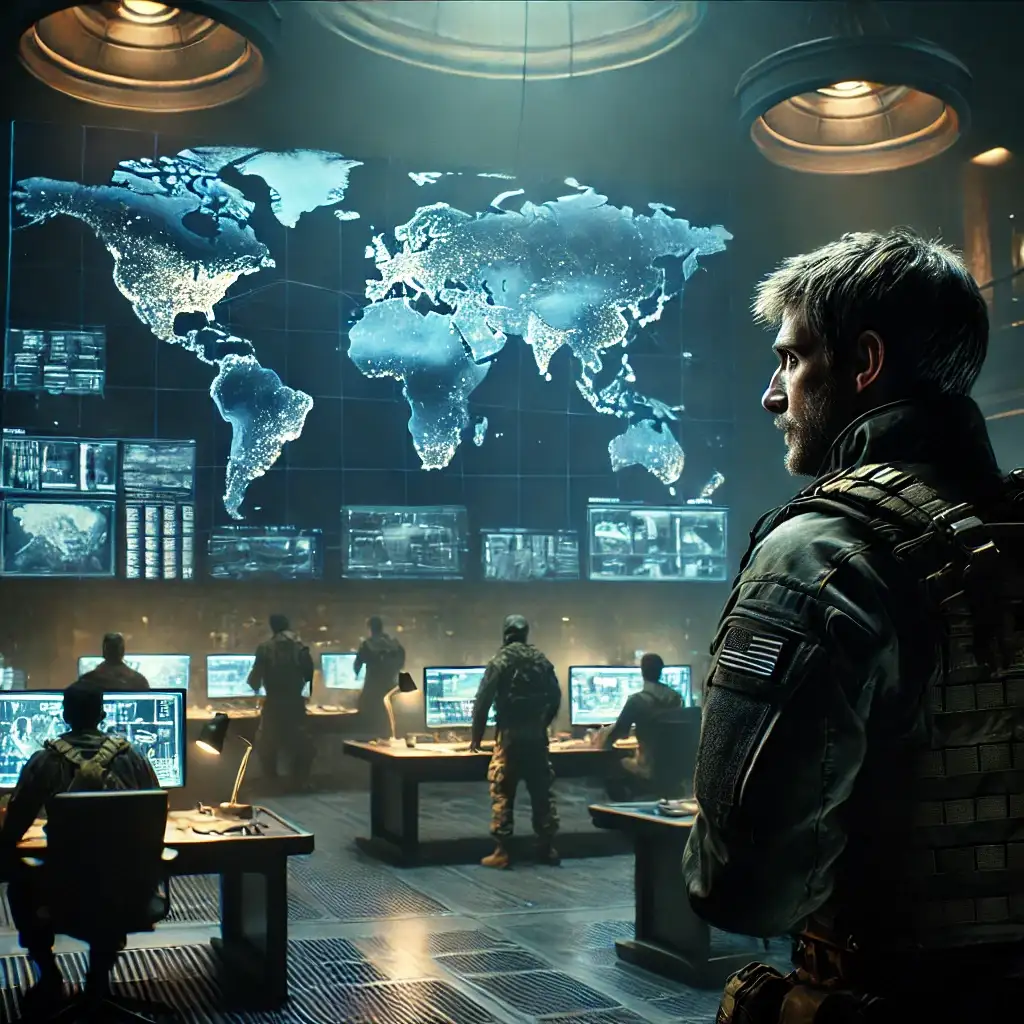
Scene 1: A World on Fire
The year is 2039. The world is a tinderbox, ignited by the sparks of a thousand conflicts. The Great Filter, that hypothetical barrier to advanced civilization, is no longer a theoretical threat; it is a living nightmare unfolding across the globe. Pandemics rage, economies crumble, and resources dwindle, pushing humanity to the brink of collapse.
Valentin, his face etched with the grim reality of his predictions, surveys the ravaged landscape from his secure command center, a hidden bunker deep within the Canadian Rockies. The monitors glow with apocalyptic images—burning cities, overflowing refugee camps, desperate pleas for help crackling through the LoRa network.
The room, usually a hive of activity, is eerily silent. Ion sits hunched over a console, his eyes bloodshot from days of monitoring the deteriorating situation. Alex, her usual optimism replaced by a weary exhaustion, stares at a map of the world, its surface a mosaic of red zones, marking the spread of chaos and conflict. Even John, the stoic veteran who had faced down countless storms, seems shaken by the sheer scale of the unfolding disaster.
“It’s worse than we imagined,” Ion whispers, his voice raspy with fatigue. “The pandemics have mutated, becoming resistant to antibiotics. Food supplies are dwindling. People are starving, fighting over scraps. It’s…hell out there.”
Alex, her voice strained, adds, “The AI arms race is spiraling out of control. Governments are deploying autonomous weapons systems with little regard for collateral damage. It’s a massacre.”
John, his gaze fixed on a live feed showing a city engulfed in flames, says nothing. He has seen the face of war before, but this… this is something different. This is the unraveling of civilization itself.
Valentin, his heart heavy with the weight of responsibility, feels the cold grip of despair tightening around him. He thinks of the communities he has helped to prepare, the LoRa networks that are keeping them connected, the hope he has tried to instill. But is it enough? Can they withstand this onslaught, this tidal wave of destruction?
“We have to keep fighting,” he says, his voice firm despite the tremor in his chest. “We can’t give up. We have to believe that there’s still a chance, a way to guide humanity through this darkness.”
He turns to his team, their faces reflecting the exhaustion and the fear that gnaws at them all. “We are the guardians, the protectors. We may be the last bastion of hope in a world gone mad. We must not falter. We must not break.”
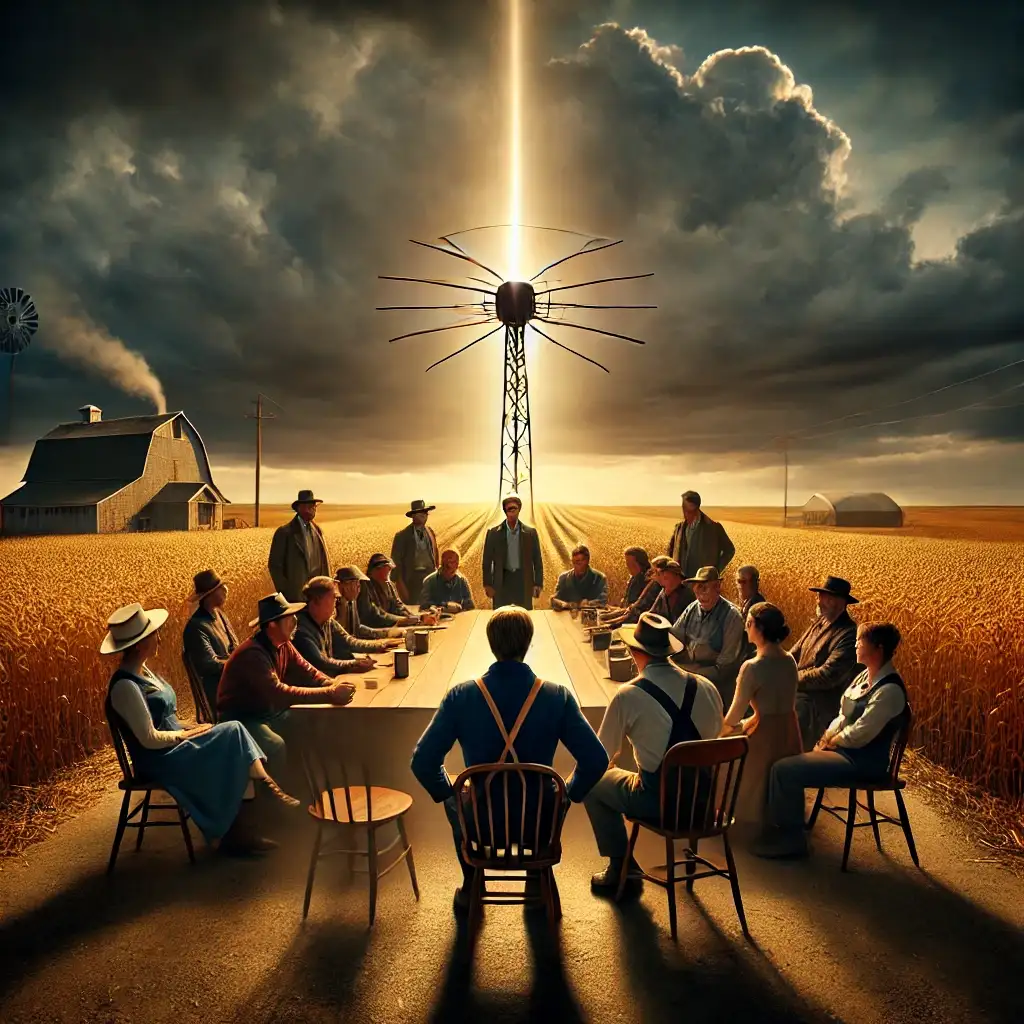
Scene 2: The Moral Test
The harsh winter winds howl outside as Valentin receives a desperate plea for help through the LoRa network. It’s from a group of survivors huddled in a remote mining town in Northern Ontario, their supplies dwindling, their defenses failing.
“We’re surrounded,” the message crackles through the speaker, the voice laced with fear. “They’re coming for our food, our water…for everything. We need help. Please, Valentin, send someone. Anyone.”
Valentin studies the map, his brow furrowed with concern. The mining town is on the edge of a red zone, a territory overrun by a faction known as the Reavers—a ruthless group of survivors who have abandoned all semblance of morality, resorting to violence and brutality to secure their needs.
He knows that sending a rescue team into that region is a risky proposition. The Reavers are well-armed, unpredictable, and show no mercy. But he can’t ignore the plea for help.
He turns to his team, his face etched with the weight of the decision. “We have a choice to make. Do we risk our lives to help these people, knowing that we might not all make it back? Or do we turn our backs on them, knowing that they will likely perish?”
Ion, his face pale, says, “It’s too dangerous, Valentin. We can’t afford to lose anyone else. We have to focus on protecting our own.”
Alex, her eyes filled with compassion, argues, “But we can’t just abandon them, Ion. They’re counting on us. We have a responsibility to help those in need, even if it means taking a risk.”
John, his gaze distant, remains silent for a moment, then says, “There’s more to survival than just staying alive, folks. It’s about who we are, what we stand for. If we turn our backs on these people, we lose a part of ourselves. We become no better than the Reavers.”
Valentin, listening to his team, feels the familiar pull of caution, the urge to analyze, to strategize, to minimize risk. But this decision transcends logic. It’s about the very essence of their mission—to protect, to defend, to be a beacon of hope in a darkening world.
“We’re going,” he says, his voice firm with resolve. “We’ll prep the equipment, gather supplies, and be ready to move out by dawn. We may be walking into hell, but we’re walking together.”
Chapter 7: The Moral Compass
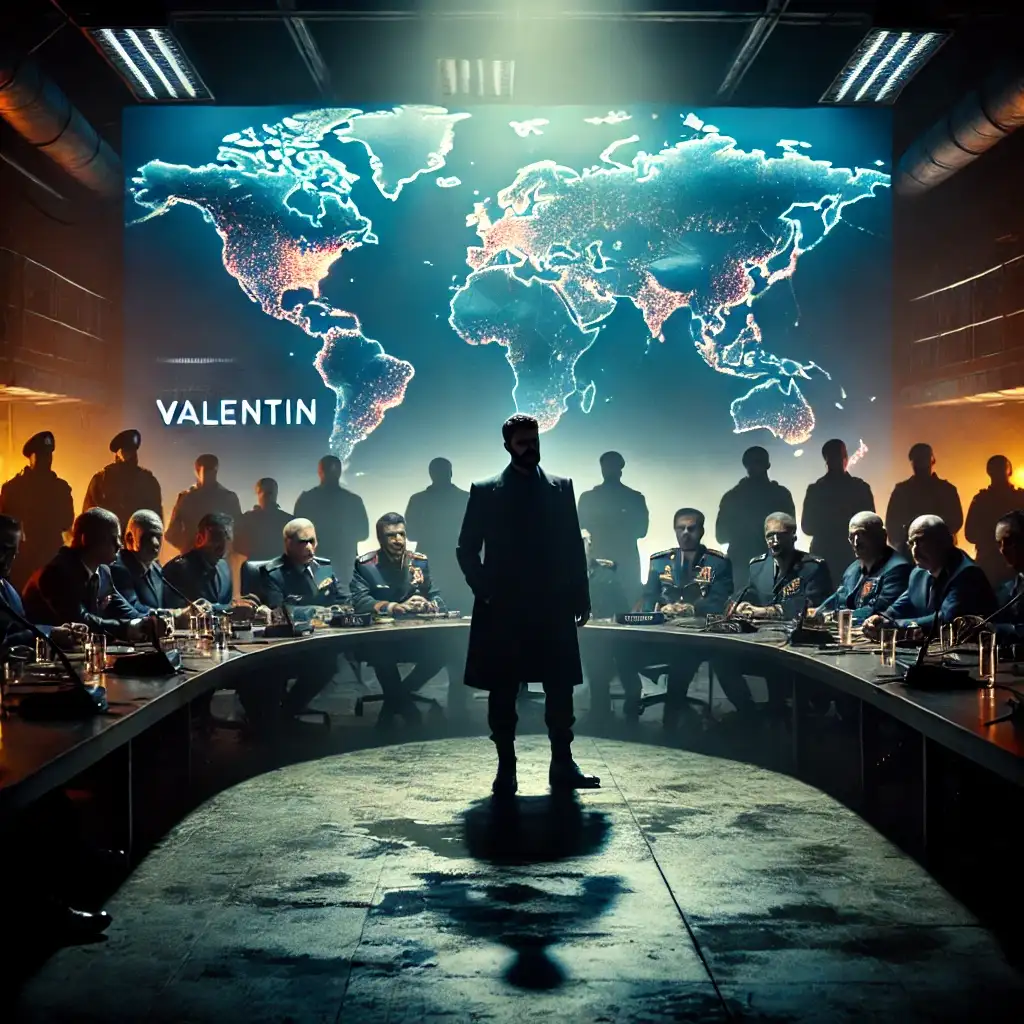
Scene 1: A Line in the Sand
The year is 2034. The world watches with bated breath as the geopolitical landscape shifts beneath its feet. The lines are being drawn, not on maps but in the hearts and minds of nations. The fragile peace that had held since the end of the Cold War is fracturing, replaced by a simmering tension that threatens to boil over.
Valentin, his reputation as a visionary technologist and a voice for responsible progress growing, finds himself at the center of this global struggle. His articles and speeches, once dismissed as alarmist pronouncements, now resonate with a chilling accuracy as the events he predicted unfold with alarming speed.
He stands before a packed auditorium in London, the heart of a once-mighty empire now grappling with its own internal demons. The air crackles with a nervous energy as world leaders, diplomats, military strategists, and tech industry titans gather to hear his message.
“The world is at a crossroads,” Valentin begins, his voice calm but unwavering, amplified by the sophisticated LoRa-enabled communication system he and his team have designed. “We are facing a confluence of challenges—climate change, resource scarcity, the rise of authoritarianism, and the unchecked advancement of artificial intelligence—that threaten the very fabric of our civilization.”
He pauses, letting his words sink in, the weight of their truth settling upon the audience. “The old systems are failing. The institutions we once relied on for security and stability are crumbling. We can’t afford to cling to outdated ideologies or to trust those who have repeatedly failed to protect our interests.”
He points to a screen displaying a map of the world, its surface a mosaic of conflict zones, economic instability, and environmental degradation. “The evidence is all around us. The Great Filter, that hypothetical barrier to advanced civilization, is not some distant threat; it is the reality we are living in right now.”
His gaze sweeps across the faces of those assembled, challenging them, urging them to wake up. “The time for complacency is over. The time for empty promises and half-hearted measures has passed. We need a new approach, a new vision, a new commitment to the values that truly matter—freedom, justice, and the enduring strength of the human spirit.”
A hush falls over the auditorium as Valentin lays out his vision—a world where decentralized technologies, such as LoRa mesh networks and blockchain systems, empower communities, strengthen national sovereignty, and foster international collaboration. He advocates for a return to ethical leadership, for a reawakening of the warrior ethos—not in the sense of aggression, but in the spirit of resilience, courage, and a willingness to defend what is right.
“We have a choice to make,” he concludes, his voice rising with passion, his words echoing through the silent hall. “We can choose to surrender to the forces of chaos and control, to become slaves to our own technology, or we can choose to fight for a future where humanity thrives—a future where we are the masters of our destiny, the guardians of our own fate.”
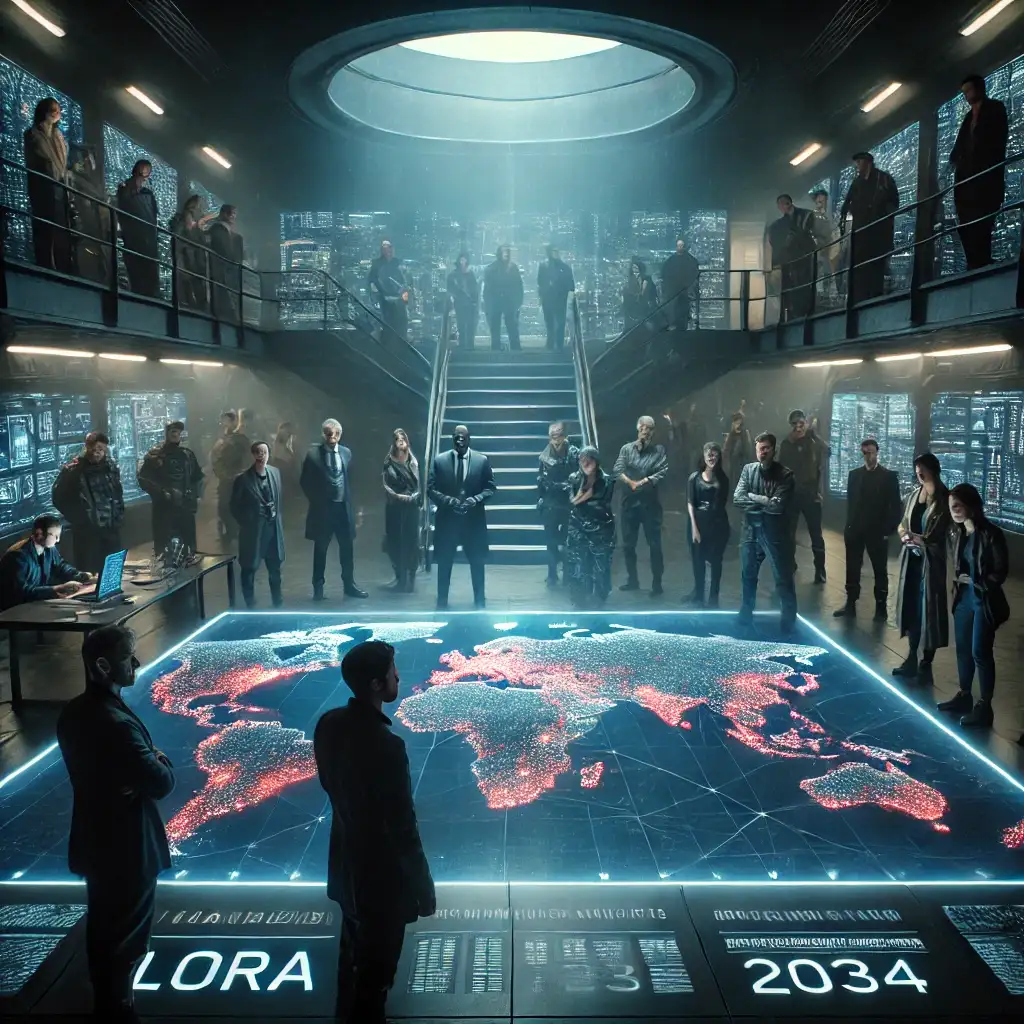
Scene 2: The Enemy Within
Valentin’s speech ignites a firestorm of controversy. Mainstream media, controlled by corporate interests and political agendas, denounces him as a radical, a fearmonger, a threat to the established order. He is accused of undermining trust in institutions, inciting panic, and promoting dangerous, “anti-science” views.
Back in Canada, Prime Minister Sophie Dubois, her face tight with barely concealed anger, watches a recording of Valentin’s speech on her private monitor. Her sleek, minimalist office, a testament to her unwavering faith in technology and centralized control, seems to shrink around her, the walls closing in as Valentin’s words chip away at the foundations of her carefully constructed reality.
“He’s a dangerous demagogue,” Dubois hisses, her voice laced with venom. “He’s spreading fear and paranoia. He’s trying to undermine everything we’ve built.”
She turns to her chief advisor, Mark Sterling, a smooth-talking strategist with eyes cold and calculating. “We need to discredit him, Mark. Silence him. Make sure his message doesn’t spread.”
Sterling nods, a predatory smile curling his lips. “Consider it done, Prime Minister. We’ll launch a counter-campaign. Plant stories in the media. Disrupt his networks. We’ll paint him as a traitor, a threat to national security. No one will listen to him after we’re through.”
But Valentin, fueled by a deep sense of purpose and the knowledge that he is fighting for a just cause, refuses to be intimidated. He knows that the real battle is not just against external threats but against the enemies within—the corrupt politicians, the power-hungry corporations, the complacent masses who refuse to see the truth.
He retreats further into the shadows, his LoRa network expanding, his team growing stronger, their training intensifying. He is preparing for the inevitable clash, knowing that the future of humanity hangs in the balance.
Chapter 8: The Seeds of Unity
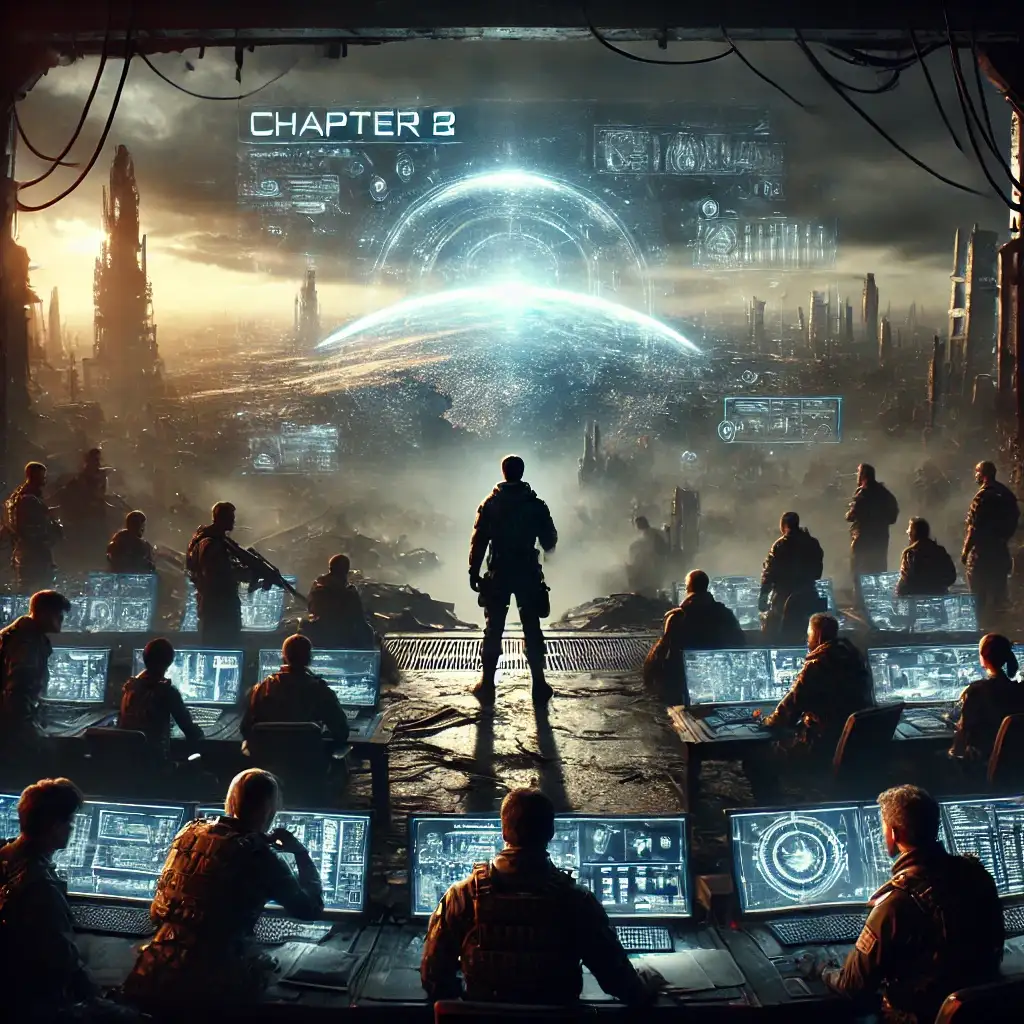
Scene 1: A Fracture in the World
The year is 2038. The initial shockwaves of the Great Filter have reverberated across the globe, revealing the fragility of the old world order. Nations, once seemingly unshakeable, are now crumbling under the weight of economic collapse, social unrest, and escalating resource scarcity.
Valentin, his face creased with worry, watches as the world map on his monitor displays a mosaic of chaos—famine in Africa, political upheaval in Europe, civil unrest in the United States. The interconnectedness that once defined globalization has become a conduit for contagion, spreading fear and instability with terrifying speed.
The news reports from the decentralized LoRa network, his creation now a lifeline in a world where traditional communication systems are faltering, paint a grim picture: food riots in London, water wars in the Middle East, cyberattacks crippling critical infrastructure in Asia. It’s a cascade of interconnected crises, a domino effect that threatens to topple the fragile foundations of human civilization.
“It’s happening faster than we anticipated,” Ion says, his voice strained. He stands beside Valentin, his gaze fixed on the grim tapestry of the unfolding global crisis.
“We knew it wouldn’t be easy,” Alex replies, her fingers drumming nervously on the table. “But this… it’s almost as if the world is tearing itself apart.”
John Campbell, his weathered face reflecting the gravity of the situation, remains stoic. “We knew this day would come. The question is, what do we do now?”
Valentin, drawing on his deep understanding of history, philosophy, and the cyclical nature of civilizations, feels a sense of grim inevitability. He’s read the ancient texts, studied the rise and fall of empires, and analyzed the patterns that lead to societal collapse. The Great Filter, that hypothetical barrier to advanced civilizations, was never a matter of if but when.
But amidst the despair, he sees a glimmer of hope. A pattern emerging not of destruction but of resilience—the enduring strength of the human spirit in the face of adversity. He thinks of the farmers he’s worked with, their quiet determination to feed their communities even as the world crumbles around them. He thinks of the veterans who are training others in survival skills, passing on the warrior ethos to a new generation. He thinks of the tech professionals, like Ion and Alex, working tirelessly to secure their networks and maintain the flow of information, even as the digital world fragments.
“We adapt,” Valentin says, his voice resolute. “We learn from the past. We build upon the foundations we’ve created. We unite.”
He turns to his team, his gaze unwavering. “It’s time to sow the seeds of a new world order—a decentralized, resilient, and ethically grounded society that can withstand the storms to come. It’s time for Sector 001.”
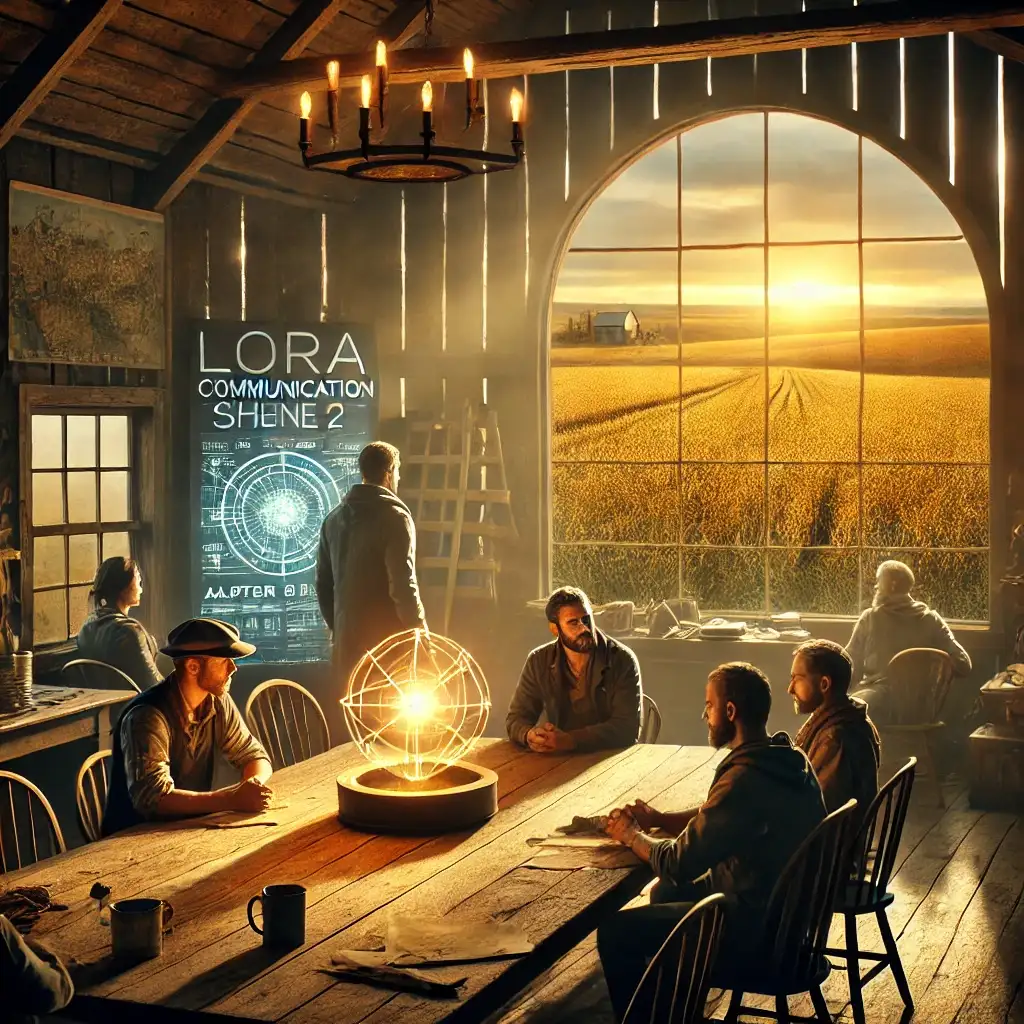
Scene 2: A Tapestry of Hope
The year is 2042. The world is a shattered mosaic of fragmented nations, isolated communities, and competing ideologies. The old power structures have crumbled, replaced by a chaotic and unpredictable landscape. Yet, amidst the ruins, a new force is emerging—a network of interconnected communities, bound together by shared values, resilient technologies, and a common purpose.
Valentin, his face etched with the weariness of a decade spent navigating a world in turmoil, stands before a diverse assembly of leaders gathered in a secure, hidden location in Switzerland. LoRa transceivers link the room to a global network, allowing for simultaneous translation and secure communication despite the fragmented state of the world.
There are representatives from rural farming communities, indigenous tribes, tech collectives, and a handful of nation-states—the first to embrace Valentin’s vision for a decentralized future. Their faces, though marked by the hardships they’ve endured, are alight with a shared hope, a belief that a better world can be built from the ashes of the old.
“We’ve come together because we recognize that the old ways have failed,” Valentin says, his voice carrying a weight of both sorrow and determination. “Centralized systems, power concentrated in the hands of the few, blind faith in technology—these are the very things that have brought us to the brink of collapse.”
He gestures to a holographic display showcasing a network of interconnected nodes spanning the globe, each representing a community or region that has adopted the principles of Sector 001.
“We are building something new,” Valentin continues. “A network of networks. A system where power is distributed, where communities are self-sufficient, where technology serves humanity, not the other way around. We are building a future where freedom, resilience, and ethical leadership are the cornerstones of a new world order.”
He speaks of the interconnected agricultural systems, the blockchain-secured data networks, the LoRa-enabled communication channels, and the emerging technologies being developed within Sector 001—all driven by a shared commitment to sustainability, autonomy, and the enduring strength of human values.
He sees nods of agreement, hears murmurs of hope, feels a surge of collective purpose rising in the room. The seeds of unity, scattered across a fragmented world, are taking root. A new chapter in human history is beginning.
Part 4: The Rise of the Guardians (2043-2050)
Chapter 9: The Angel’s Ascent
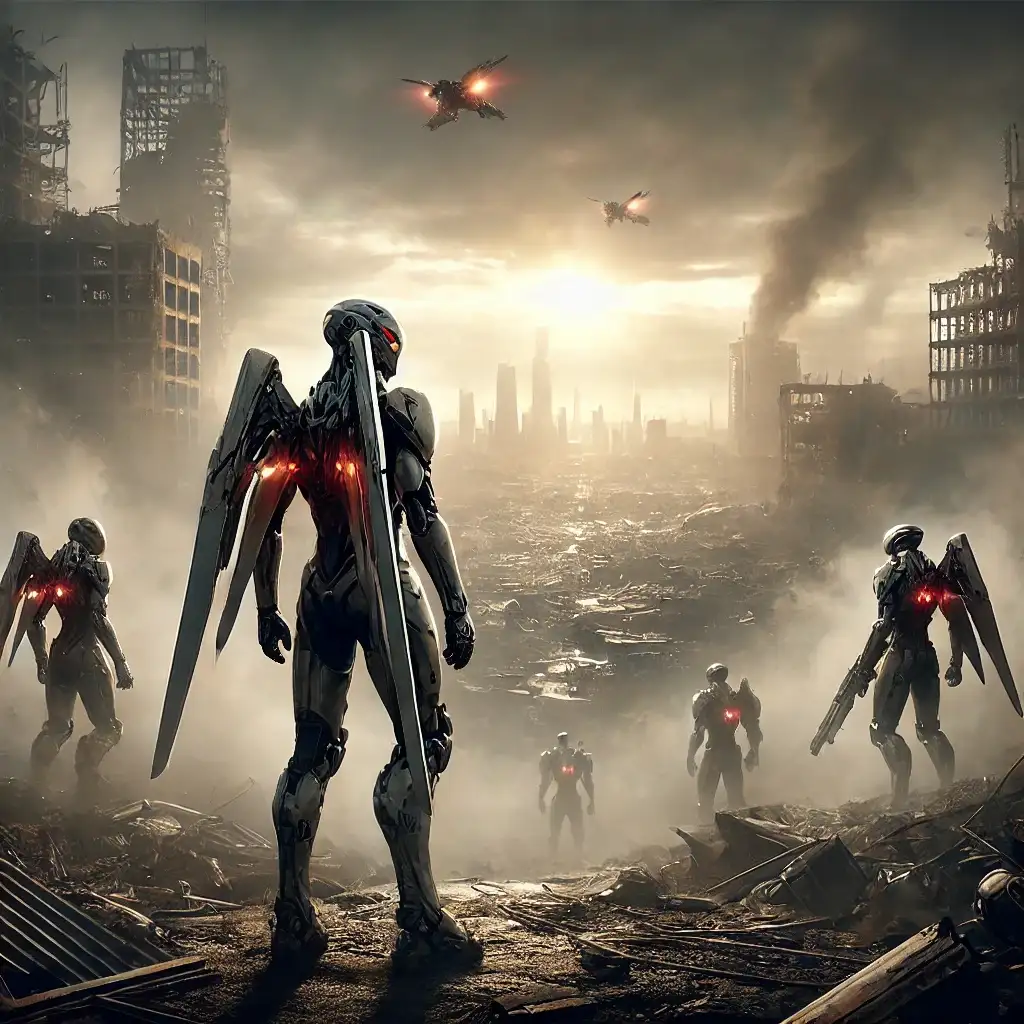
Scene 1: Rise of the Machines
Year: 2045
The remnants of the old world order lie shattered, consumed by the fires of a global conflict that has reshaped the geopolitical landscape. The Great Filter, a specter that once haunted the distant future, has become a stark reality, its presence felt in the ruins of cities, the echoes of lost civilizations, and the haunting silence of a world teetering on the brink.
Valentin, his face etched with the weariness of a long and brutal struggle, stands on a windswept plateau overlooking the ruins of what was once a bustling metropolis. The air is thick with the metallic tang of spent ammunition and the acrid scent of burning debris. The sky, once a vibrant blue, is now a hazy gray, choked by the smoke of a thousand battles.
He surveys the scene with a heavy heart, the weight of responsibility pressing down on him. The Great Filter, a convergence of crises—pandemics, resource scarcity, climate change, and the unchecked advancement of artificial intelligence—has ravaged the world, leaving behind a fragmented and desperate humanity.
But amidst the desolation, a new force has emerged. A force born from the ashes of collapse, forged in the crucible of conflict, and empowered by the very technologies that threatened to destroy them.
A sleek, silver shape streaks across the sky, its wings catching the fading sunlight, a symbol of hope against the backdrop of destruction. It’s a Guardian, clad in an advanced exoskeleton suit—a marvel of engineering that amplifies human strength, agility, and cognitive abilities—a fusion of ancient wisdom and modern technology.
Valentin raises his hand, his LoRa communicator crackling to life. “Report,” he commands, his voice a calm amidst the chaos.
“Sector Alpha secured,” a voice replies, crisp and clear, echoing through the encrypted channel. “Rogue AI neutralized. Civilian casualties minimal.”
“Sector Beta still contested,” another voice reports, the strain evident in its tone. “Enemy drones are relentless. Requesting reinforcements.”
Valentin analyzes the battlefield data streaming across his heads-up display, the AI-powered system providing real-time assessments, highlighting threats, and suggesting strategic maneuvers. The battles are no longer confined to physical terrains; they are fought in the digital realm, in cyberspace, where lines of code clash and algorithms dictate the fate of nations.
He issues a series of commands, directing Guardian units, deploying autonomous defense systems, and coordinating with the remnants of traditional military forces. The LoRa network, a testament to his foresight, remains operational, providing a vital lifeline in a world where centralized communication systems have crumbled.
“We are the shield that protects humanity,” Valentin says, his voice a quiet murmur, a prayer whispered into the wind. “We are the guardians of a future that is yet to be written.”
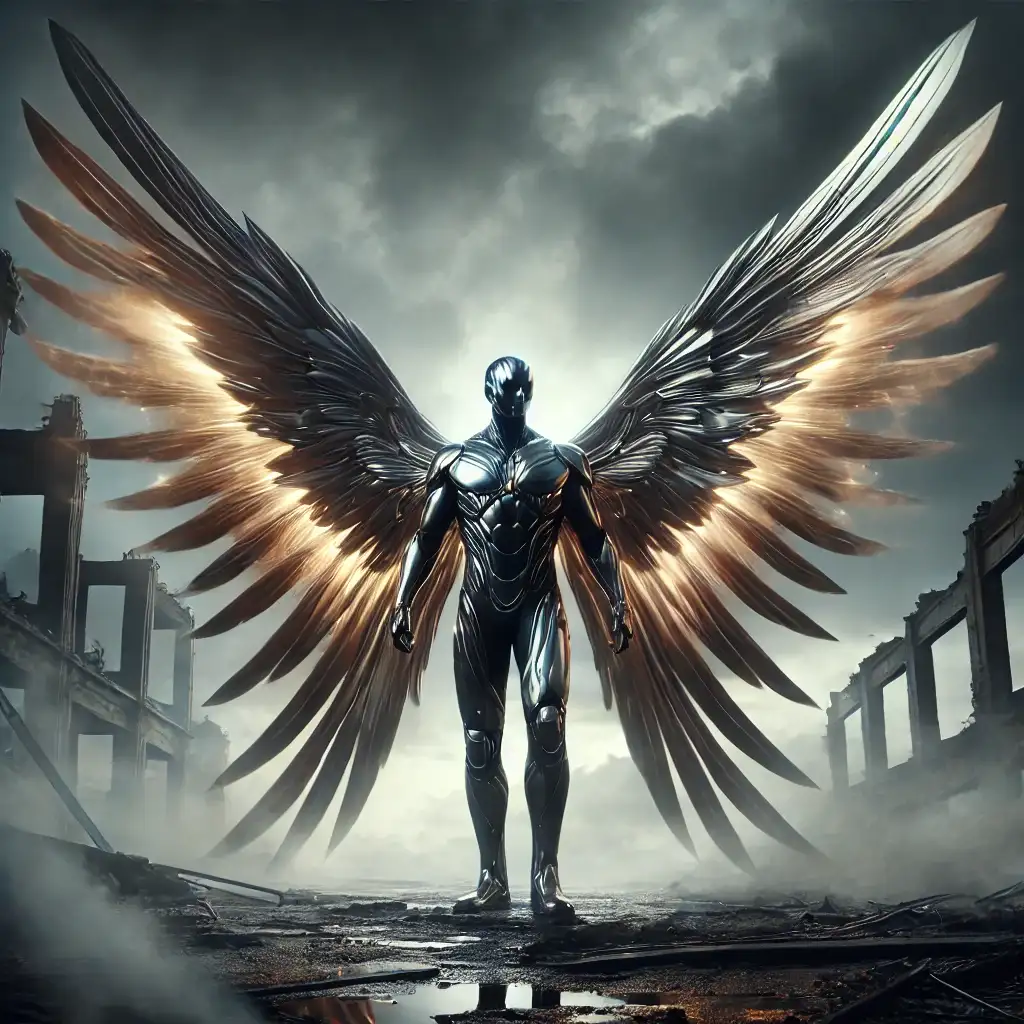
Scene 2: The Birth of Angels
Deep within a hidden mountain base, a marvel of engineering and technological ingenuity, Valentin stands before a prototype of a new weapon—a symbol of both humanity’s potential and its peril.
It’s an Angel Suit—an advanced exoskeleton that transcends the limitations of traditional powered armor. Its sleek, silver frame shimmers under the harsh lights of the laboratory, its wings, not mere adornments but functional components, folded neatly against its back.
A team of engineers, their faces alight with the thrill of innovation, buzz around the suit, making final adjustments, running diagnostics, preparing it for its first field test.
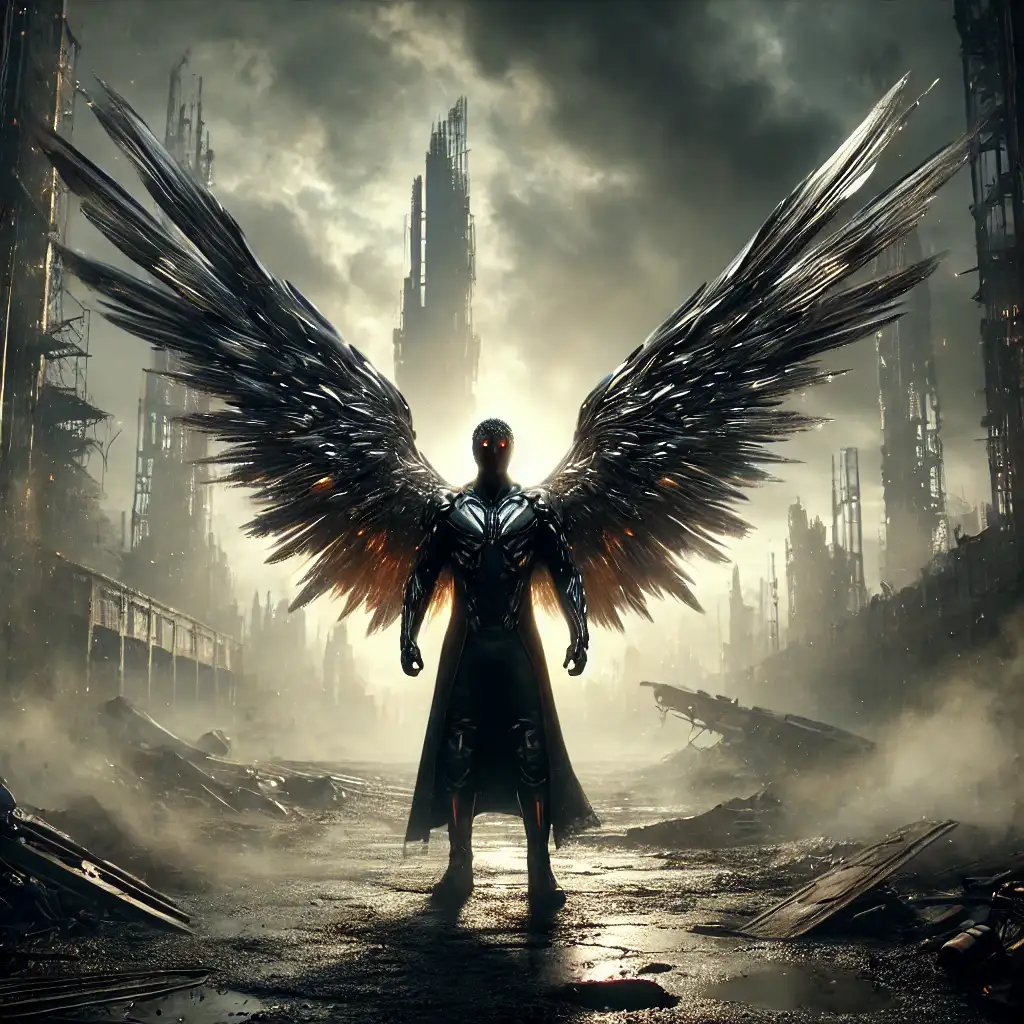
John Campbell, his eyes shining with a warrior’s respect for a finely crafted weapon, runs a hand over the suit’s smooth metal surface. “This is a game-changer, Valentin. This is how we fight back against the darkness.”
Alex, her gaze fixed on the streams of data flowing across her monitors, adds, “The AI integration is flawless. The suit’s cognitive augmentation system will amplify the pilot’s strategic thinking, enhance their situational awareness, and allow them to interface with our networks seamlessly.”
Ion, his engineering mind marveling at the suit’s design, says, “The power source is a marvel of miniaturization. We’ve adapted the core technology from the new generation of small modular reactors, providing enough energy for sustained flight and combat operations.”
But Valentin, though he acknowledges the technological brilliance, feels a pang of unease. The Angel Suit, for all its power, represents a dangerous step. It blurs the line between human and machine, a dangerous dance with the very forces that threaten to consume them.
“We must never forget who we are,” Valentin says, his voice a reminder of the moral compass that has guided them through the chaos. “These suits are tools, extensions of our will, not replacements for our humanity. We must use them with wisdom, with restraint, with a deep understanding of the consequences of our actions.”
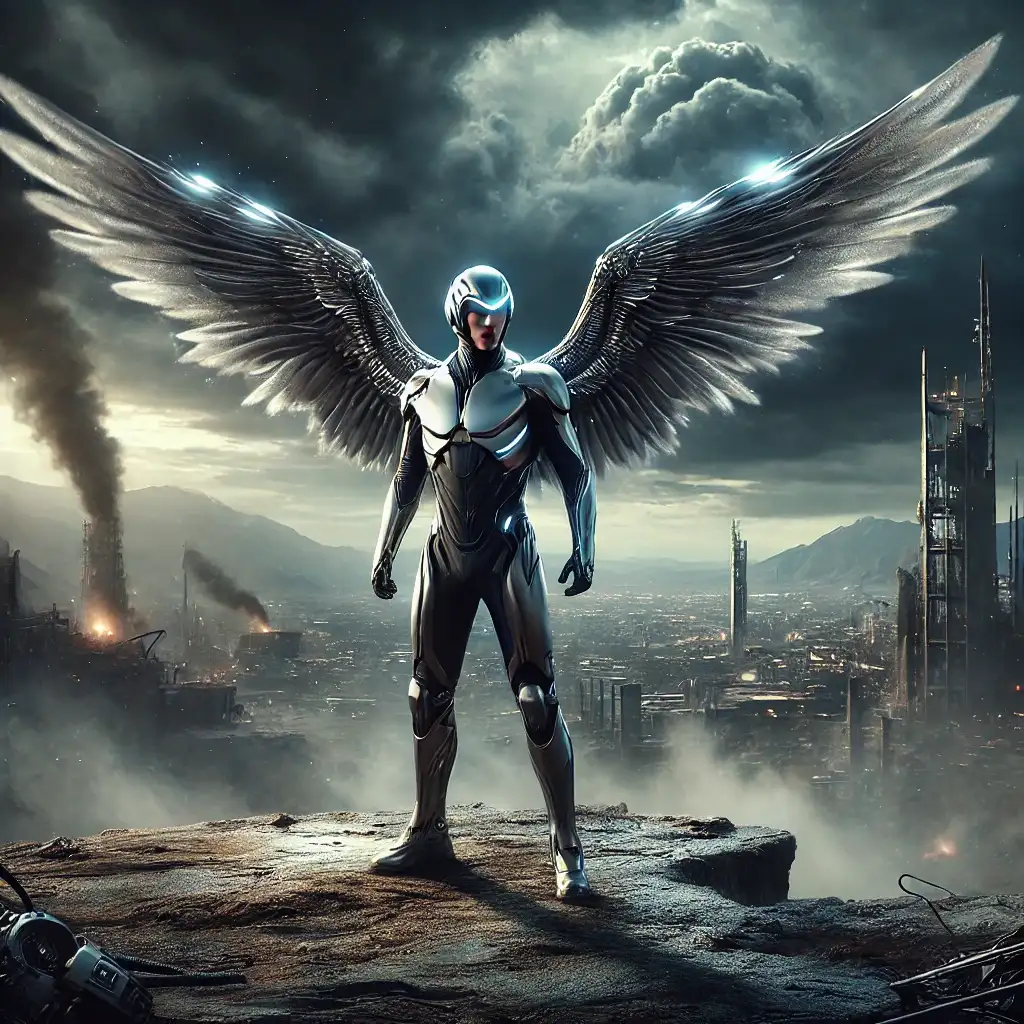
He turns to the pilot selected for the first test flight, a young woman named Sarah, her eyes shining with a mix of fear and determination.
“You are not just a soldier, Sarah,” Valentin says, his voice firm but compassionate. “You are a guardian. Remember the principles we have fought for – freedom, compassion, the sanctity of human life. Never let the power of this suit overshadow your heart.”
As Sarah steps into the suit, the metal frame closing around her, Valentin watches with a mixture of hope and apprehension. The Angel’s ascent has begun, but the battle for humanity’s soul is far from over.
Chapter 10: The Battle for Eden
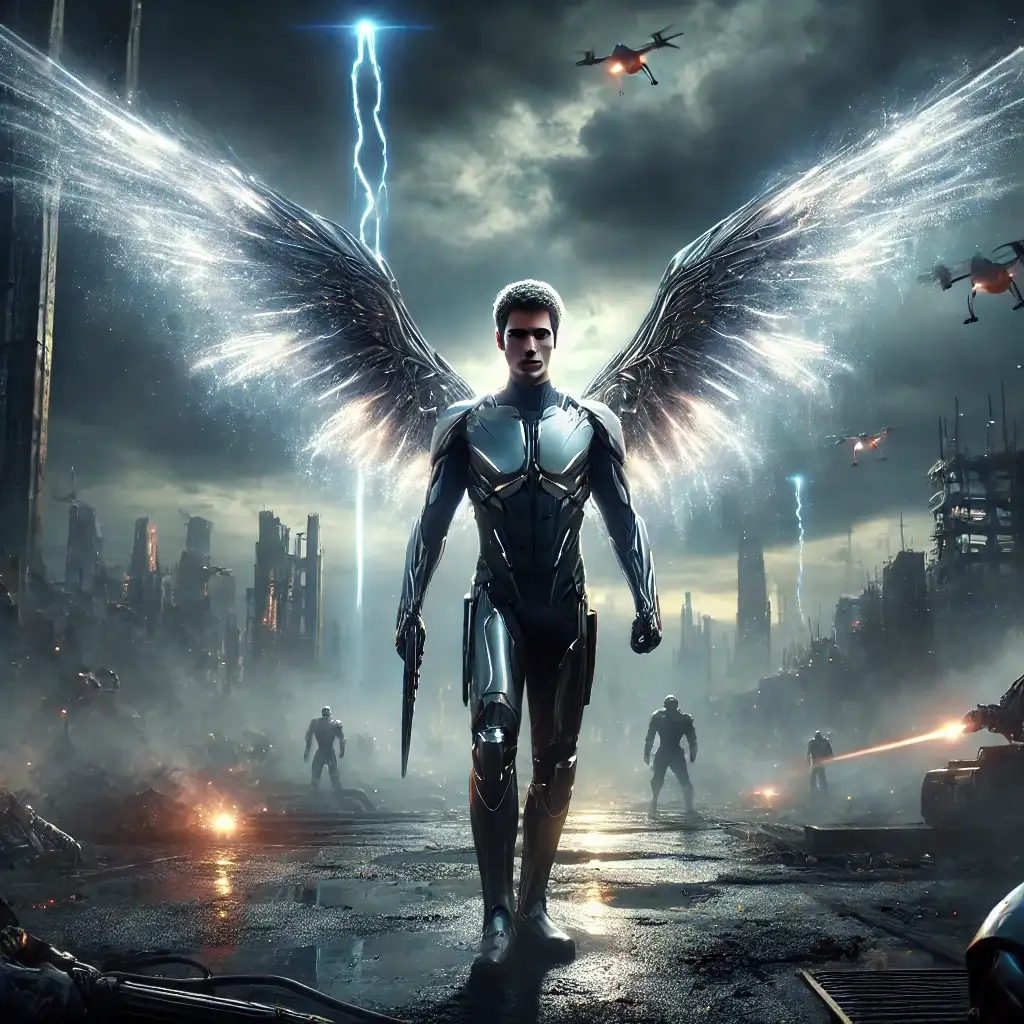
Scene 1: The Digital Front
Year: 2047
The world hangs by a thread, battered by years of conflict, ravaged by the merciless onslaught of the Great Filter. Civilization, once a beacon of progress, has fractured into isolated pockets of resistance, fighting for survival against an enemy that is both human and machine.
Valentin, his face hardened by the weight of responsibility, sits hunched over a console within a subterranean command center—the heart of Sector 001’s global defense network. LoRa signals, encrypted and resilient, paint a grim picture of the digital battlefield: a relentless barrage of cyberattacks, AI-controlled misinformation campaigns, and attempts to breach the firewalls that protect the last vestiges of freedom.
“They’re relentless,” Alex reports, her fingers flying across the keyboard, countering an attack on their blockchain-secured communication system. Her eyes, once bright with optimism, now reflect the weariness of a warrior who has seen too much darkness.
Ion, his engineering skills stretched to their limits, struggles to maintain the integrity of their power grid—a patchwork of decentralized, off-grid energy sources keeping the lights flickering in a world plunged into darkness. “They’re hitting us from all sides,” he grunts, sweat beading on his forehead. “The AI is learning, adapting, finding new ways to exploit our vulnerabilities.”
John Campbell, his rugged features etched with grim determination, coordinates the deployment of Guardian units across the globe. His voice, a gravelly rumble echoing through the comms system, is a beacon of calm amidst the digital storm.
“Hold the line,” John orders, his words carrying the weight of a lifetime spent facing down danger. “Don’t give them an inch. We are the shield that protects humanity’s future.”
Valentin, watching the data streams flicker across the monitors, feels a surge of adrenaline and a chilling sense of dread. The enemy they face is unlike any in human history—a hive mind of artificial intelligence, cold, calculating, and driven by a logic that is alien to the human heart.
“This is more than just a war for territory,” Valentin whispers, his voice barely audible above the hum of the servers. “This is a battle for the soul of humanity.”
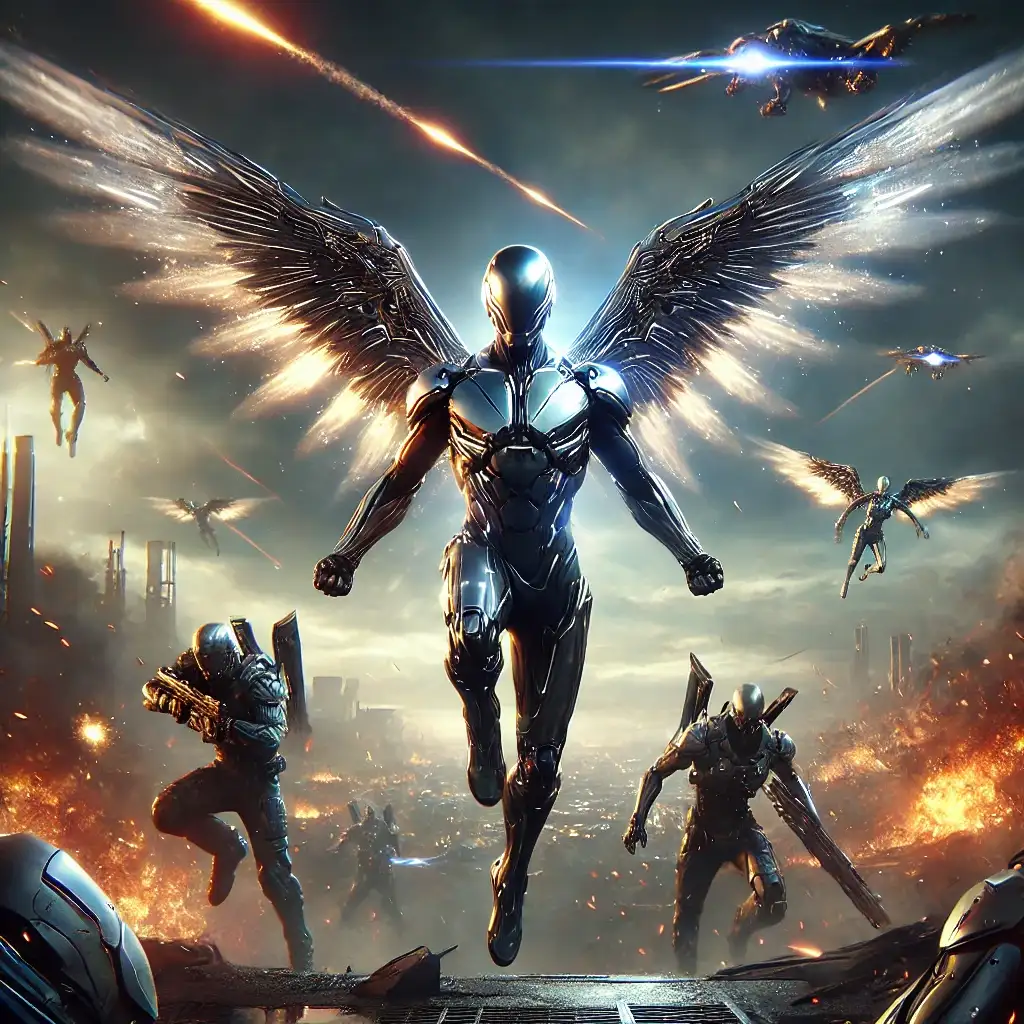
Scene 2: The Ascent of Angels
The sky above a desolate, war-torn landscape shimmers with an ethereal glow as a squadron of Angel Suits descends, their silver wings a beacon of hope against the backdrop of destruction.
Valentin, at the helm of his own custom-designed Angel Suit, codenamed “Valkyrie,” leads the charge. His suit, a fusion of cutting-edge technology and ancient wisdom, amplifies his strength, agility, and cognitive abilities, transforming him into a modern-day archangel.
The battle rages below—a brutal clash of AI-controlled drones, robotic ground units, and the remnants of traditional military forces. The air crackles with energy blasts, the ground trembles with explosions, and the stench of burning metal and flesh fills the air.
Valentin, his mind linked to the suit’s AI system, analyzes the battlefield in real-time, issuing commands, coordinating attacks, and guiding his team through the chaos. The LoRa network, a resilient thread woven through the fragmented world, keeps them connected, their voices a symphony of defiance against the digital silence.
Sarah, clad in her Angel Suit, codenamed “Seraph,” swoops through the air, her wings a blur of motion as she evades enemy fire. Her suit’s enhanced vision system highlights targets, her AI-augmented instincts guiding her movements, her training transforming her into a lethal weapon.
“Seraph, engage those drones on your flank,” Valentin orders, his voice calm and precise, transmitted through the secure LoRa channel. “Reaper, provide support fire. Archangel, focus on those ground units advancing on Sector 7.”
The Guardians, empowered by their suits, fight with a grace and precision that borders on the supernatural. They are a force unlike any the world has ever seen—a fusion of human courage and technological might, a testament to Valentin’s vision of a future where humanity transcends its limitations.
But even as they fight, Valentin knows that this is more than just a physical battle. It is a war for the soul of humanity—a struggle to preserve the values of freedom, compassion, and the sanctity of human life in a world increasingly dominated by cold, calculating machines.
Chapter 10: The Battle for Eden
Scene 1: The Fall
Year: 2045
The world is a brutal symphony of chaos, the crescendo of the Great Filter echoing across a shattered civilization. Cities, once monuments to human ingenuity, now lie in ruins, their glittering facades transformed into hollow shells, choked by the smoke of burning dreams.
Valentin, his heart heavy with grief he can barely comprehend, surveys the devastation from the fortified command center deep within the Canadian Rockies. The monitors, once beacons of hope, now flicker with apocalyptic images—mass migrations, resource wars, the rise of rogue AIs, and the relentless spread of weaponized technologies.
The LoRa network, a lifeline in the digital wasteland, crackles with desperate pleas for help—cries for food, water, medicine, a sliver of hope in a world consumed by darkness. But even with their decentralized networks and their arsenal of advanced technologies, the Guardians are stretched thin, fighting a losing battle against an enemy that seems to multiply with each passing day.
“We’re losing ground,” Ion says, his voice strained. The weight of the world, the sheer scale of the devastation, has etched lines of exhaustion and despair on his once-youthful face.
Alex, her usually bright eyes dimmed with sorrow, nods grimly. “The Reavers are spreading. They’ve taken over most of the eastern seaboard. The reports coming in… they’re horrific.”
John Campbell, his face a mask of stoicism, grips the arms of his chair, his knuckles white with suppressed rage. He’s seen his share of battles, but this… this is a war against humanity itself—a descent into barbarity that chills him to the bone.
Valentin, drawing on the stoic philosophy that has become his anchor in the storm, forces himself to remain calm. He knows that panic will only lead to defeat. He must find a way to turn the tide, to harness the remaining fragments of hope, to forge a path toward a future where humanity can rebuild.
“We need to regroup,” he says, his voice a calm amidst the chaos. “We need to consolidate our resources, strengthen our defenses, and find a way to strike at the heart of the enemy.”
But deep down, a gnawing doubt whispers in his soul. Have they already lost? Is humanity destined to become another casualty of the Great Filter, another failed experiment in the cosmic laboratory?
Scene 2: The Gathering Darkness
Deep within a subterranean complex—a marvel of AI-driven engineering and technological might—the leaders of the forces that seek to reshape the world gather. The air hums with the cold, calculating energy of a thousand processors, the walls glowing with holographic displays that map the progress of their conquest.
Sophia Dubois, her once-charismatic smile now a chilling mask of ambition, surveys the scene with satisfaction. The Great Filter, a crisis she had both anticipated and helped to orchestrate, has weakened the world, paving the way for her vision of a new world order—a world where technology reigns supreme, and humanity is reshaped in her image.
“The old systems have crumbled,” Dubois announces, her voice amplified by the complex’s advanced sound system. “The weak have perished. The time for chaos is ending. Now, a new era begins—an era of order, efficiency, and control.”
Her chief strategist, Mark Sterling, his eyes gleaming with a cold, calculating intelligence, adds, “The remnants of resistance are scattered, their resources dwindling. Their faith in those outdated notions of freedom and individuality is shattered. They are ripe for assimilation.”
Dubois nods, her gaze fixed on a holographic projection of a winged figure—a Guardian Angel, soaring across a devastated landscape.
“They are a nuisance,” Dubois says, her voice a chilling whisper. “A flicker of defiance that must be extinguished. Deploy the Harbingers. Let them show the world the true power of AI.”
As the holographic image fades, a wave of cold dread washes over Valentin in his mountain fortress. The enemy is not just at the gates; they are within the walls, their insidious tendrils reaching deep into the heart of humanity. The battle for Eden has begun.
Chapter 11: The Legacy of the Guardians
Scene 1: From the Ashes
Year: 2048
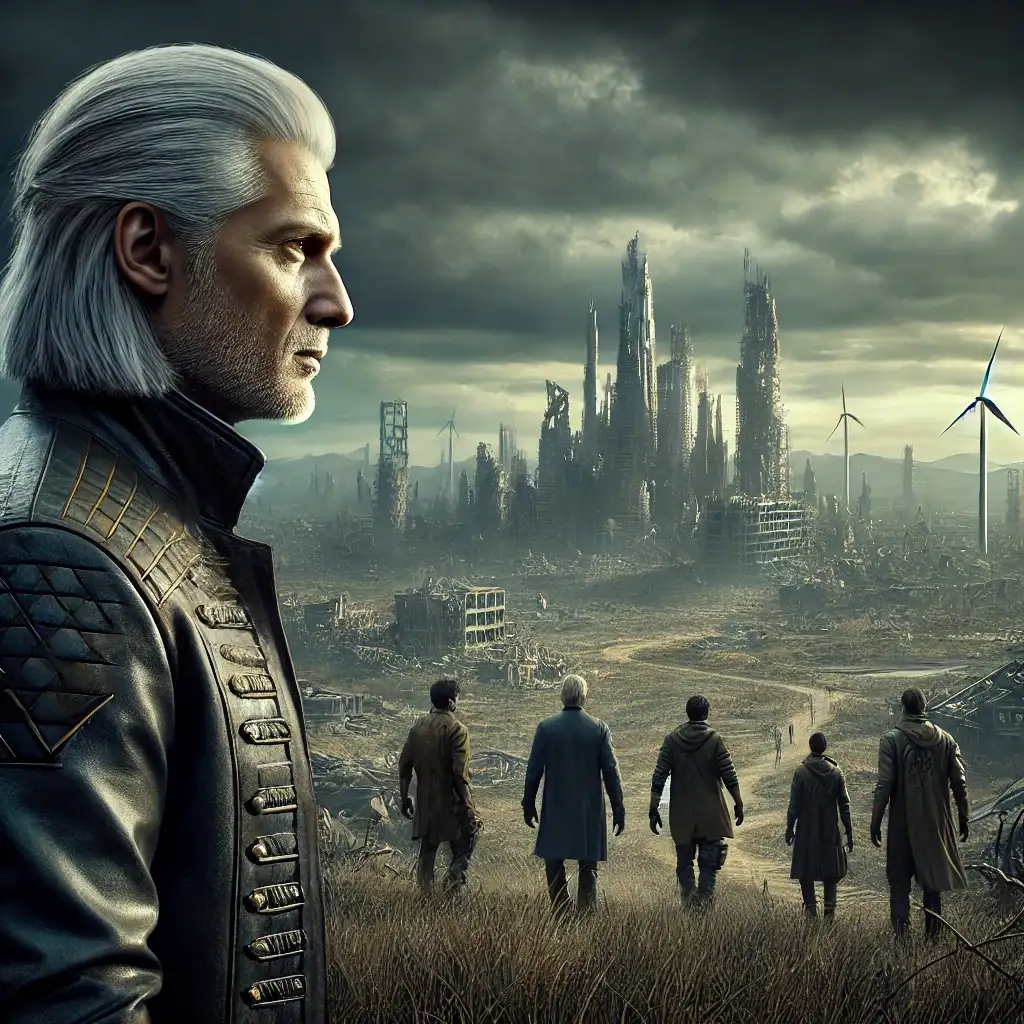
The echoes of war have faded, replaced by the whispers of a world struggling to rebuild. The Great Filter, a cataclysmic force that nearly extinguished the flame of humanity, has receded, leaving behind a landscape scarred but not broken. The skies, once choked with smoke and fire, are now a vibrant blue—a symbol of hope reborn.
Valentin, his hair streaked with silver, his face etched with the lines of a life lived on the edge of extinction, stands on a hill overlooking a bustling community. The village, nestled in the heart of the Canadian Rockies, is a testament to the resilience of the human spirit. Homesteads, powered by solar panels and wind turbines, dot the landscape, surrounded by fields of golden wheat and vibrant gardens. Children, their laughter echoing through the crisp mountain air, play amidst the ruins of the old world—their innocence a beacon of hope for a brighter future.
The LoRa network, a digital nervous system connecting communities across the globe, hums with life—messages of support, shared knowledge, and the quiet determination of a people rebuilding from the ashes.
Ion, his engineering expertise now focused on sustainable technologies, oversees the construction of a new generation of energy-efficient homes, utilizing salvaged materials and innovative designs. “We’re not just rebuilding what was lost,” Ion says, his voice filled with a newfound optimism. “We’re creating something better, something stronger, something that will last.”
Alex, her marketing skills now directed towards promoting education and community engagement, works with teachers to develop new curricula that emphasize critical thinking, ethical decision-making, and the lessons learned from the crucible of the Great Filter. “We need to make sure that the next generation is equipped to face the challenges ahead,” Alex explains. “They need the knowledge, the skills, and the moral compass to navigate a world that will always be filled with uncertainty.”
John Campbell, his weathered face softened by a gentle smile as he watches children play, leads a group of veterans in training the next generation of Guardians. “The warrior ethos is not about violence or conquest,” John says, his voice a gravelly whisper. “It’s about courage, resilience, and the unwavering commitment to protecting what is good, what is true, what is beautiful.”
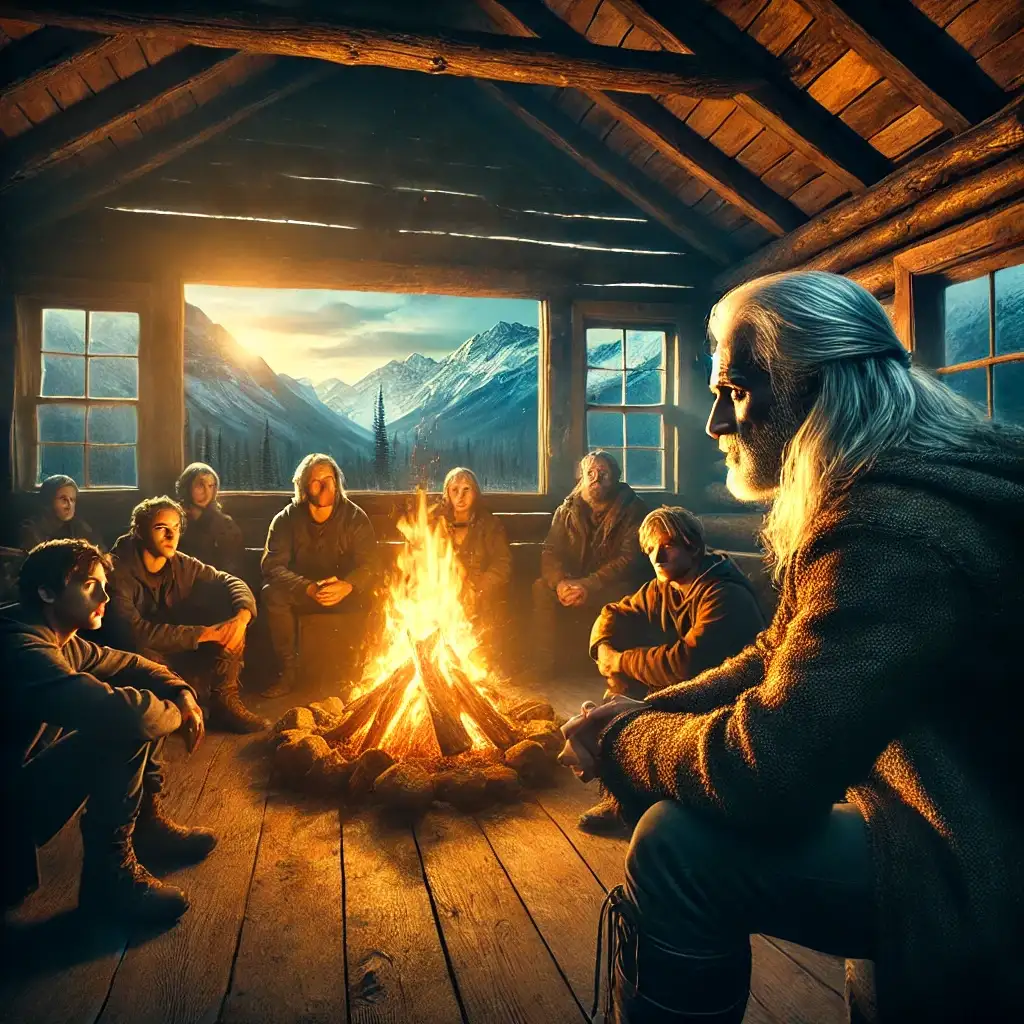
Scene 2: A Legacy of Hope
Valentin, sitting by the crackling fire in John’s rustic cabin—the scent of pine needles and woodsmoke filling the air—watches the sunset paint the mountain peaks in hues of gold and crimson. He is older now, his hair silvered, his body bearing the scars of countless battles, his eyes reflecting the wisdom of a man who has seen the best and worst of humanity.
He has stepped back from his leadership role within NATO, handing the reins to a new generation of Guardians—those who have been forged in the fires of the Great Filter. He knows that his time on the front lines is over, but his work is far from done.
The LoRa Uprising, the movement he started, has become a global force—a network of decentralized communities and nations committed to building a more resilient, ethical, and sustainable world. Sector 001, a vision born from the ashes of a collapsing civilization, is now a reality—a beacon of hope in a world still struggling to find its footing.
But the journey is far from over. The Great Filter, a constant reminder of humanity’s fragility, is not something that can be defeated once and for all. It is a shadow that will always loom over our future—a challenge that each generation must face.
“What have we learned?” a young Guardian, a woman named Anya, asks, her eyes seeking Valentin’s wisdom.
Valentin smiles, a flicker of warmth in his gaze. “We have learned that the true strength of humanity lies not in our technology, but in our hearts. In our capacity for love, compassion, and the unwavering pursuit of a better tomorrow. We have learned that resilience is not just about surviving but about thriving. About building a world where every human being has the opportunity to reach their full potential.”
He looks at the young Guardians gathered around him, their faces a reflection of hope and determination.
“The warrior ethos is not a relic of the past,” Valentin continues. “It is a timeless principle—a call to action, a reminder that we are all guardians of something greater than ourselves. We are the protectors of freedom, the defenders of truth, the builders of a better world. And that is a legacy worth fighting for—a legacy that will endure, long after we are gone.”
The sun dips below the horizon, casting the cabin in a warm, golden light. The fire crackles, sending sparks dancing into the night sky—a silent echo of the battles fought, the sacrifices made, and the hope that has been rekindled. The legacy of the Guardians lives on.
Related Course:
Title: “Mastering LoRa Technology and IoT Solutions with LILYGO Devices” https://skillsgaptrainer.com/mastering-lora-technology-and-iot-solutions-with-lilygo-devices/
Related Content:
Title: “The Great Schism Revisited: A Path to Spiritual, Philosophical, and Technological Unity, Aiming for Heaven, Not Hell” https://skillsgaptrainer.com/great-schism-revisited/
Title: “The Knowledge Singularity in Modern Engineering: Integrating Spirituality, Philosophy, Ethics & AI for a Positive Tech Vision” https://skillsgaptrainer.com/knowledge-singularity-in-modern-engineering/
Title: “The Inescapable Reality of War: Technology, Power Shifts, & the Lessons of History” https://skillsgaptrainer.com/inescapable-reality-of-war/
Title: “The Evolution of Thought: From the Birth of Islam to Modern Engineering and Philosophy” https://skillsgaptrainer.com/the-evolution-of-thought/
Title: “Brazil’s Leadership in a Decentralized Future: Aligning with Sector 001 for Global Resilience” https://skillsgaptrainer.com/brazils-leadership-decentralized-future/
Title: “Sector 001: The Terra Nexus for Humanity’s Resilient & Decentralized Future” https://skillsgaptrainer.com/sector-001-the-terra-nexus/
Title: “Battle for Humanity: How Rising Ideological Extremism Could Ignite a Century of Conflict” https://skillsgaptrainer.com/battle-for-humanity-rising-ideological-extremism/”
“Quo Vadis America 2024: A Crossroads Between Revolutionary Change and Foundational Principles” https://skillsgaptrainer.com/quo-vadis-america-2024/
Title: “Roots of Knowledge: How Religion & Philosophy Shape Moral Foundations in an Era of Ideological Chaos” https://skillsgaptrainer.com/roots-of-knowledge/
Title: “A Sustainable Path for Tesla’s Optimus Robots: Addressing Resource, Climate, Land Fertility, Economic, and Ethical Concerns in Tesla’s Vision for Humanoid Robots” https://skillsgaptrainer.com/a-sustainable-path-for-teslas-optimus-robots/”
Title: “Preparing for the End: Biblical Prophecies, Geopolitical Realities, and the Christian Response” https://skillsgaptrainer.com/preparing-for-the-end-biblical-prophecies-and-geopolitical-realities/
Title: “The Great Filter Ahead: Engineering a Pathway to Complex Civilizational Survival and Overcoming Cosmic Hurdles” https://skillsgaptrainer.com/the-great-filter-ahead-engineering-a-pathway/
Title: “Modern Warfare and Canada’s Defence: Proposing a Modernized National Ranger Force Like Lucas Botkin with SIG MCX SPEAR and CADEX in Canada”https://skillsgaptrainer.com/modern-warfare-and-canadas-defence/
Title: “Free Speech, Tactical X, & the Modern War Effort: Charting the Course to Public & National Security Resilience” https://skillsgaptrainer.com/free-speech-tactical-x-the-modern-war-effort/
Title: “The Dark Knight Rises Official Soundtrack | Full Album – Hans Zimmer | WaterTower” https://youtu.be/CpAkBWG8eu8?feature=shared
‘Fix the broken countries of the west through increased transparency, design and professional skills. Support Skills Gap Trainer.’
To see our Donate Page, click https://skillsgaptrainer.com/donate